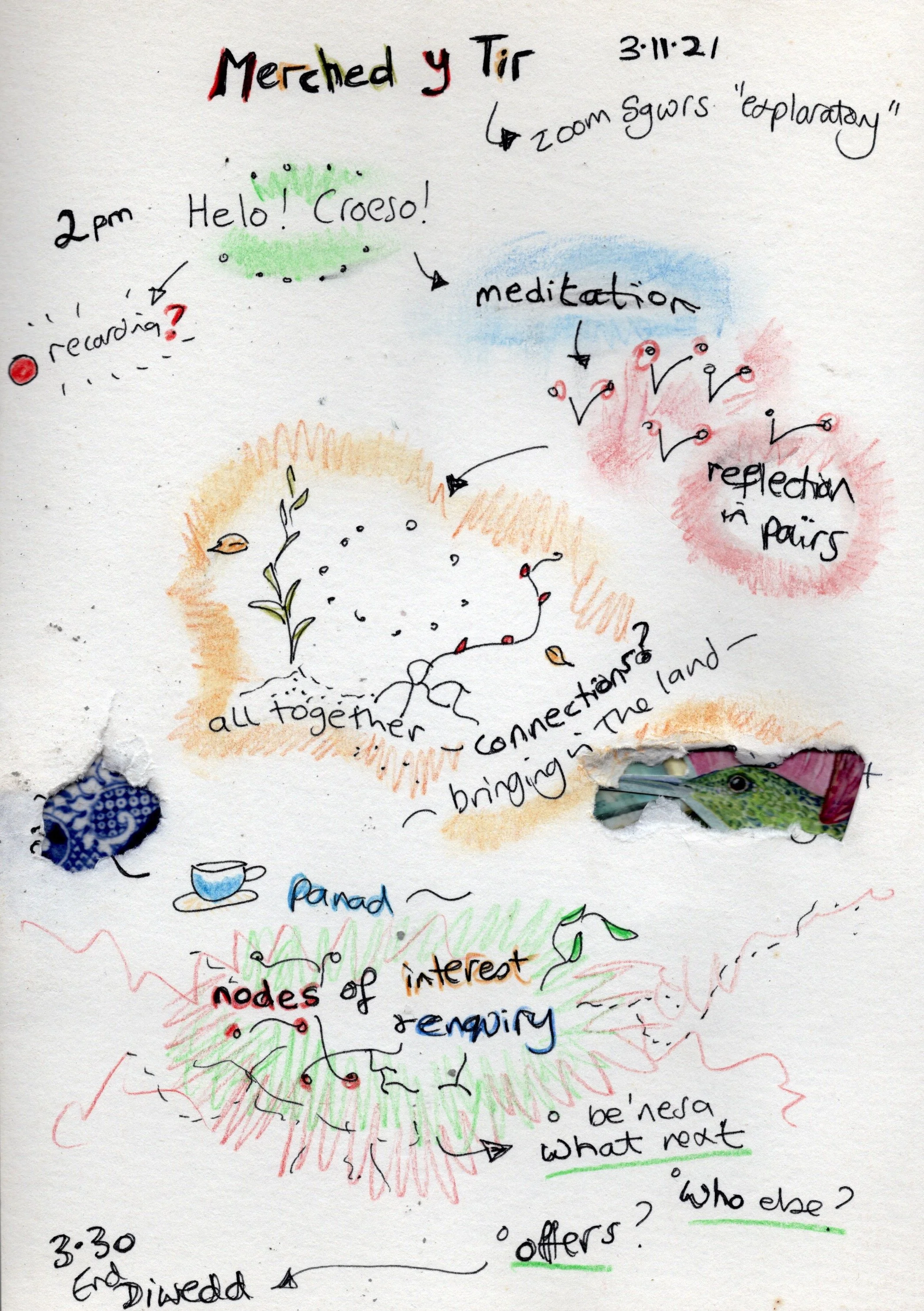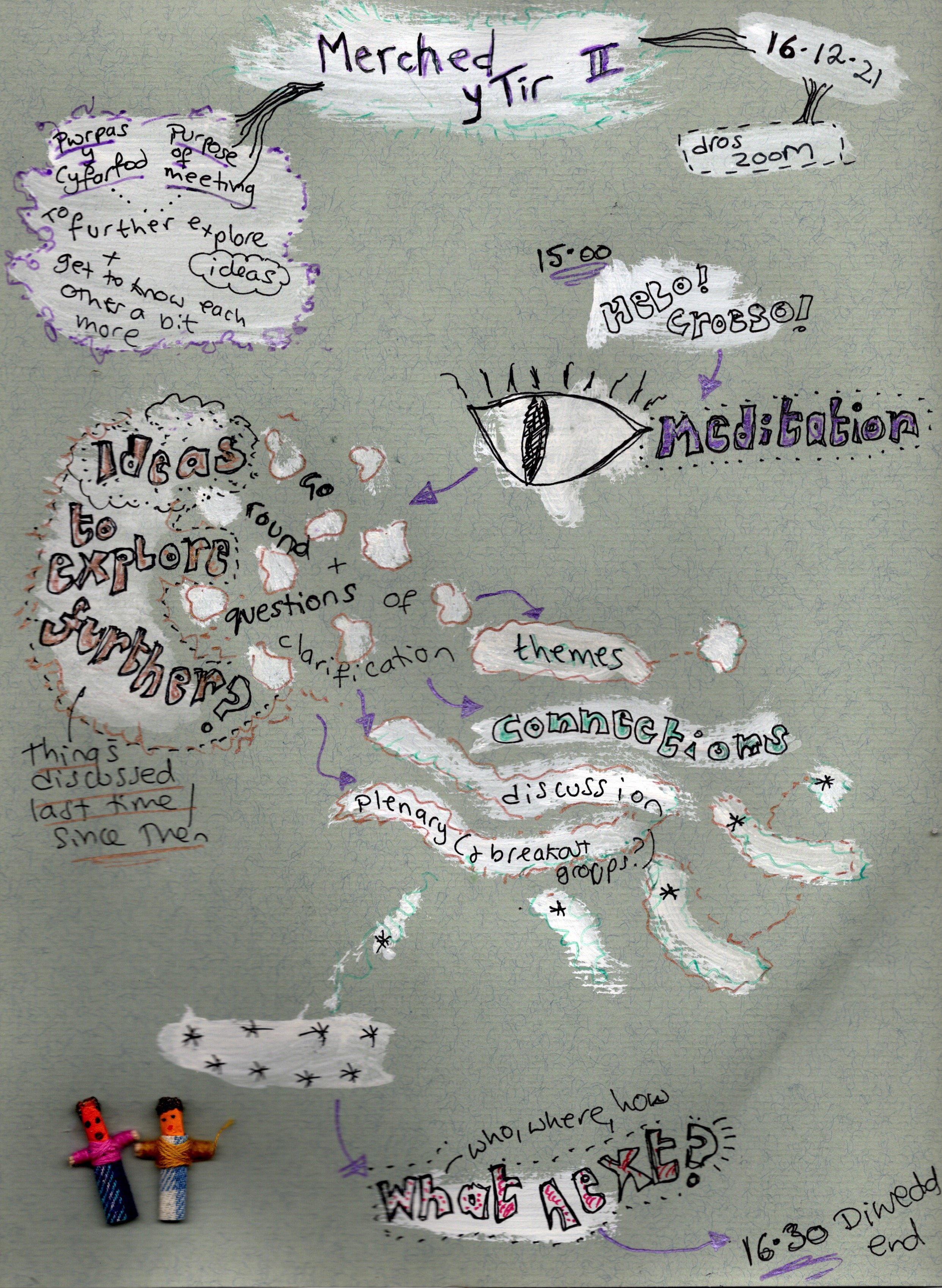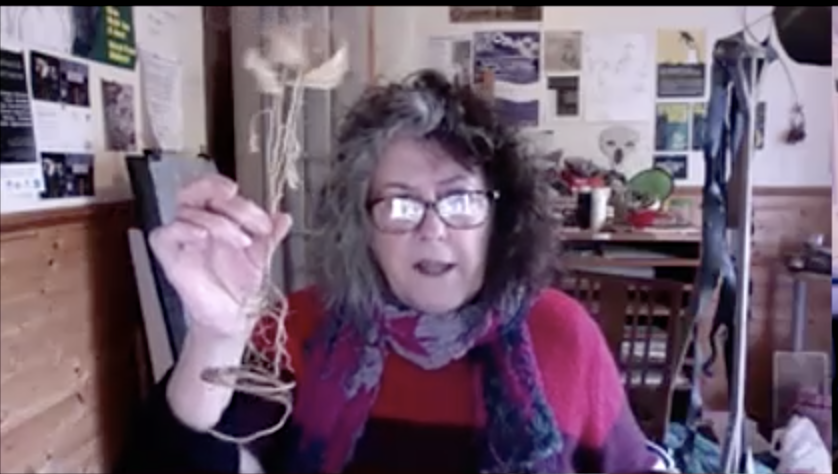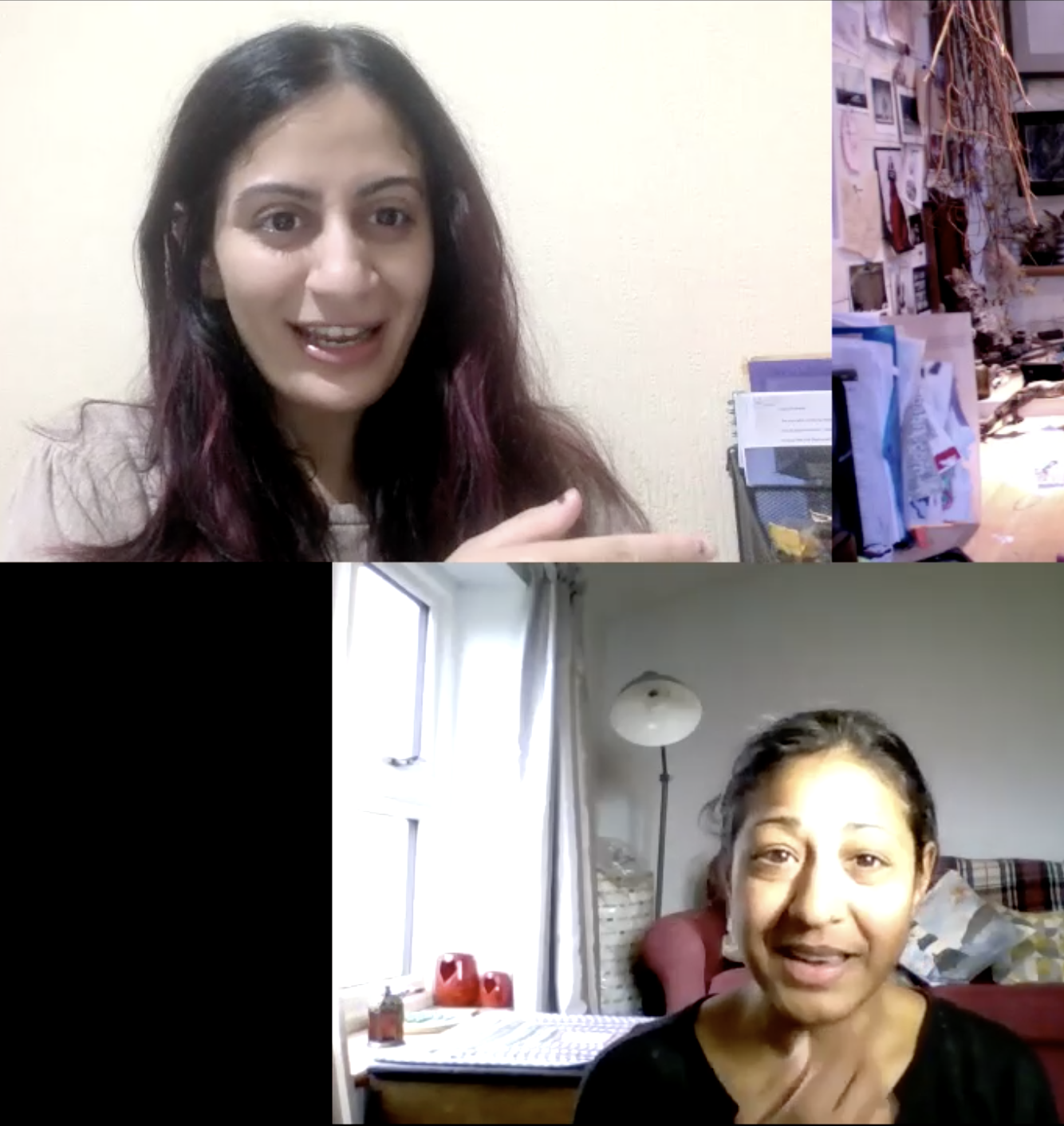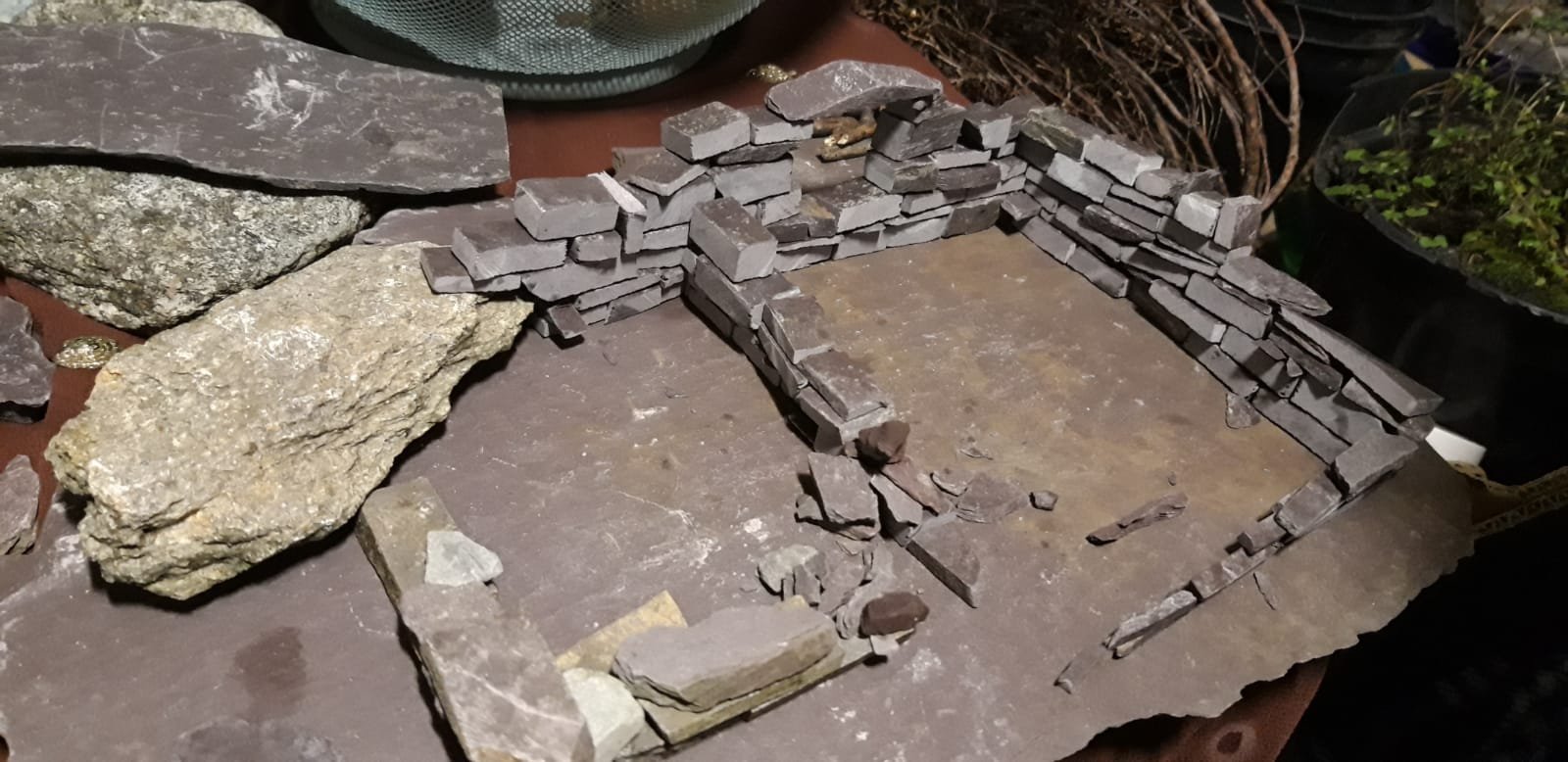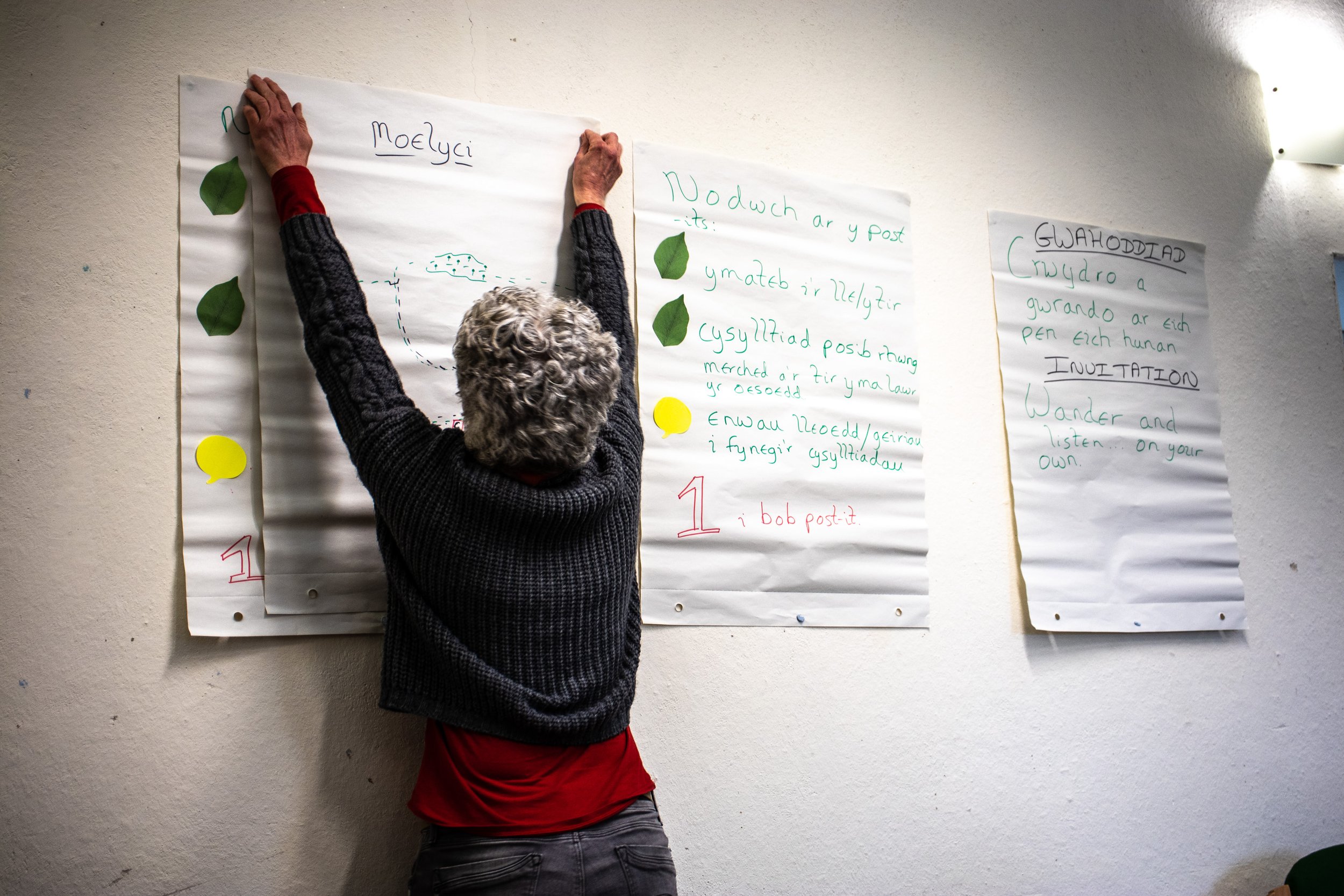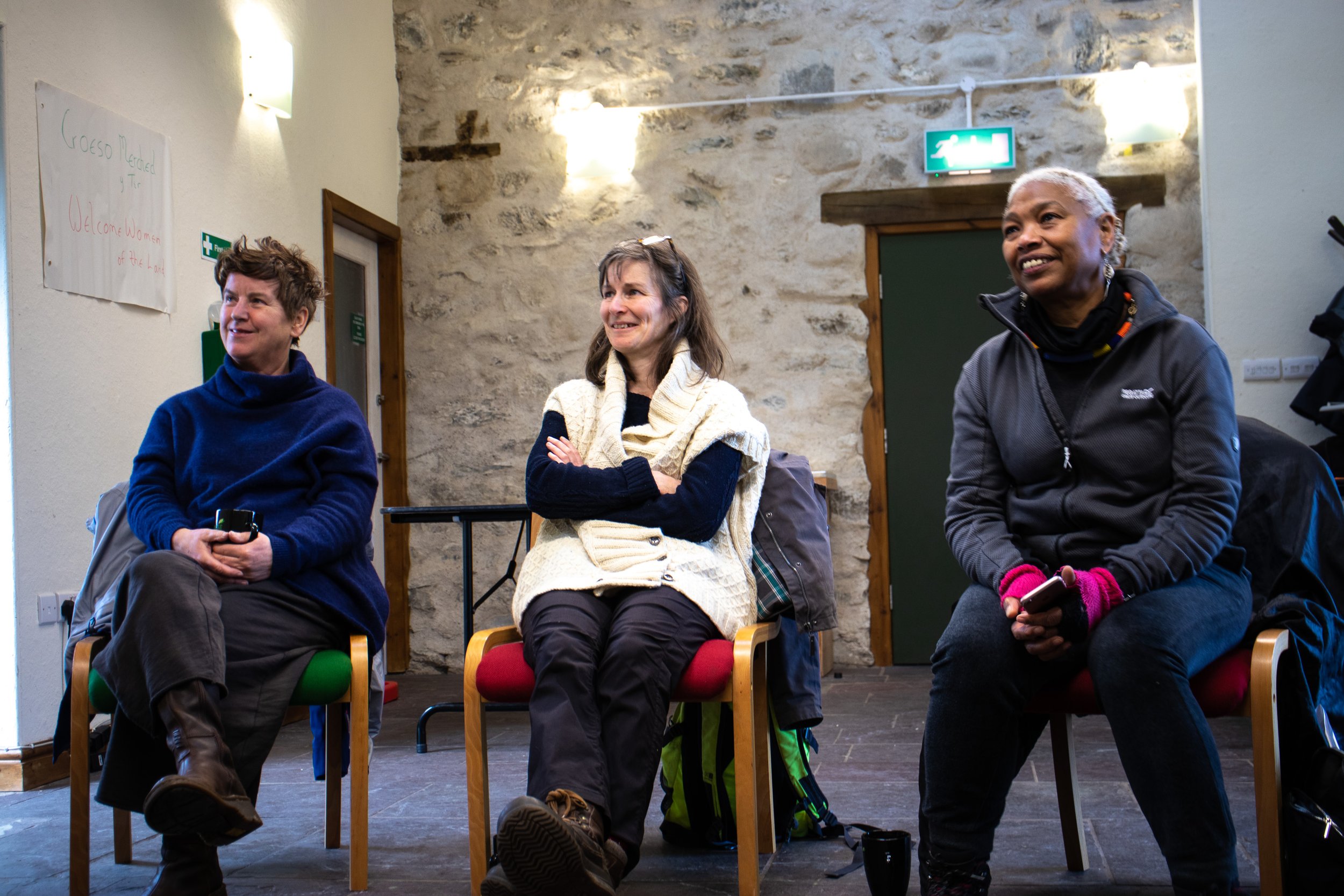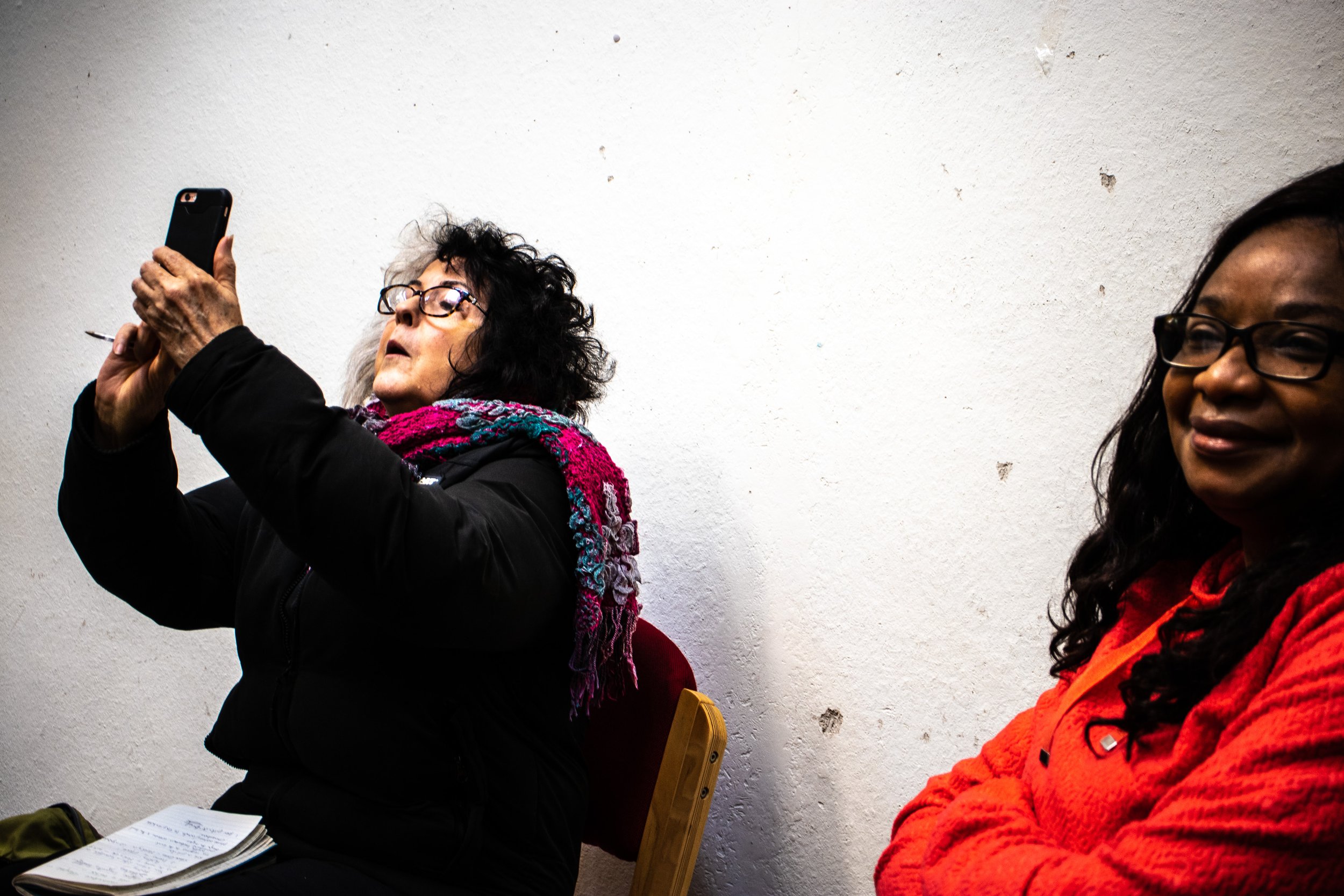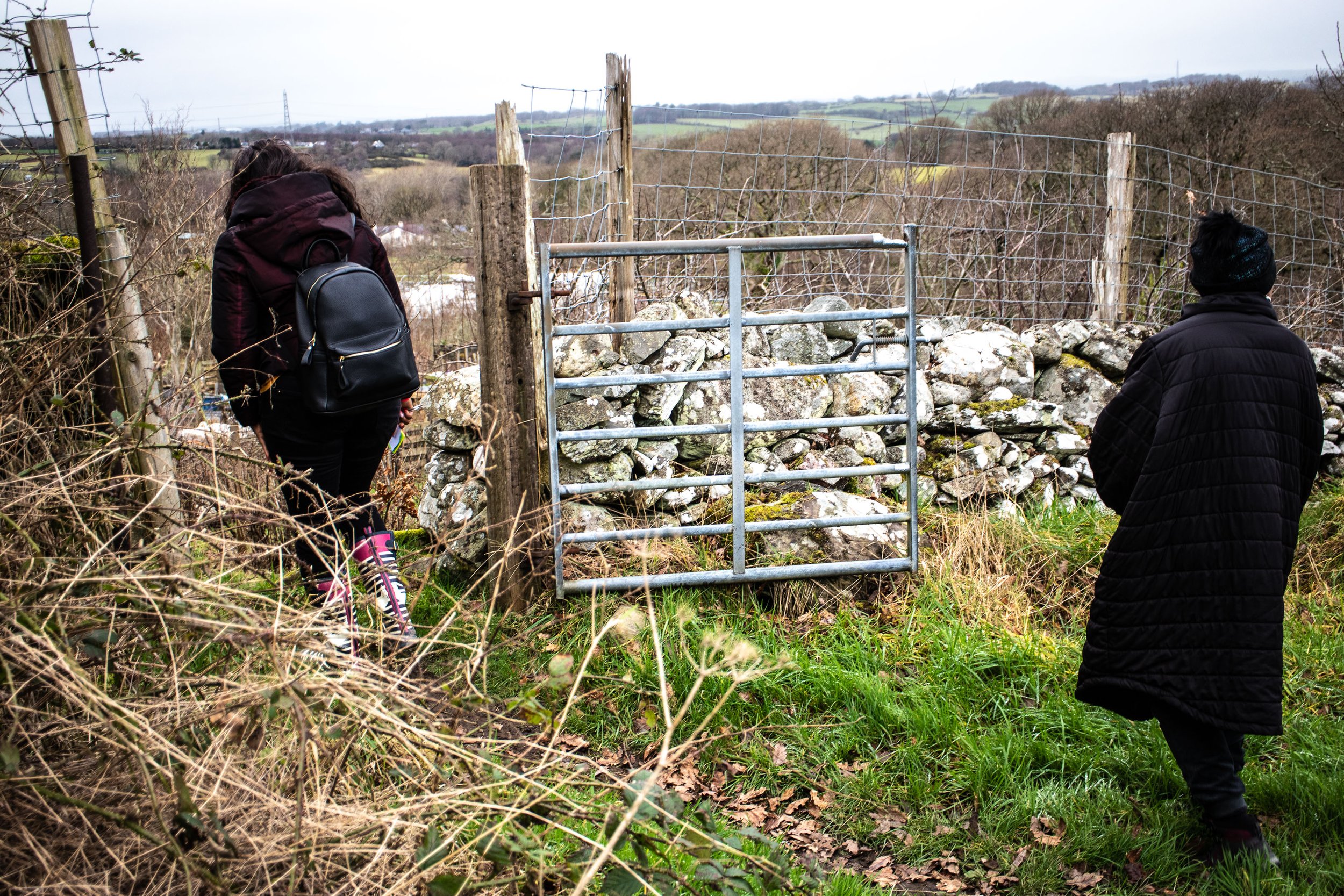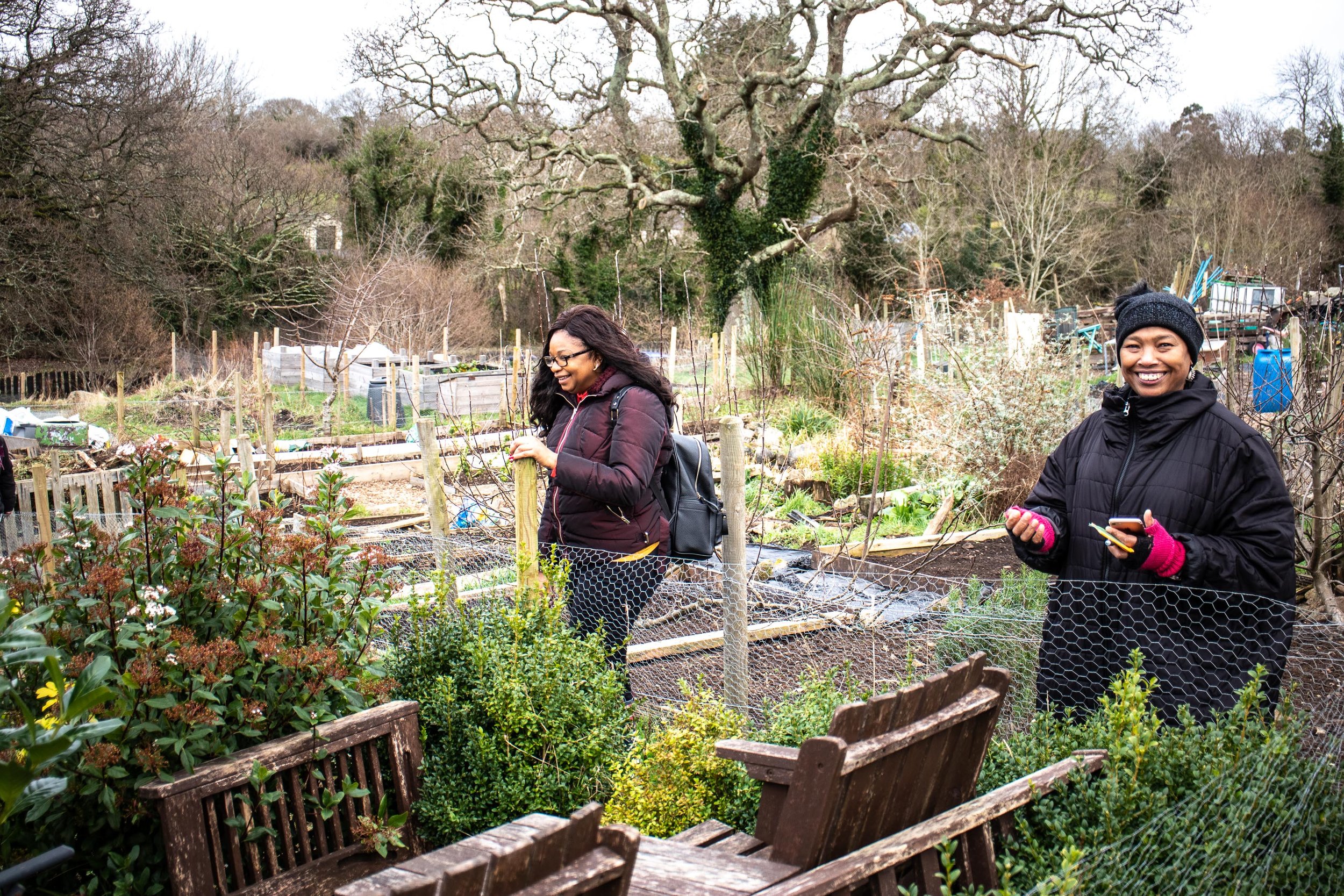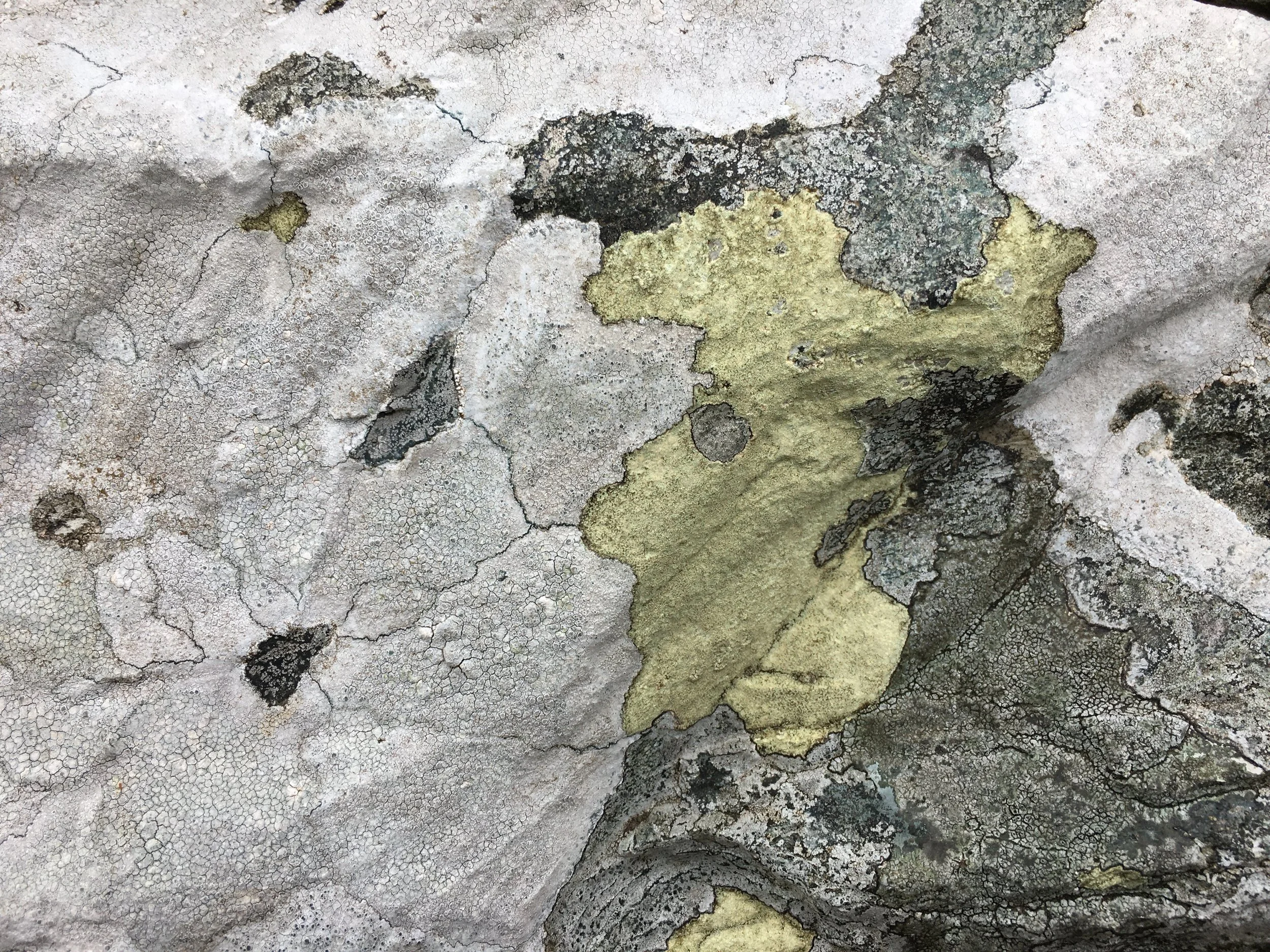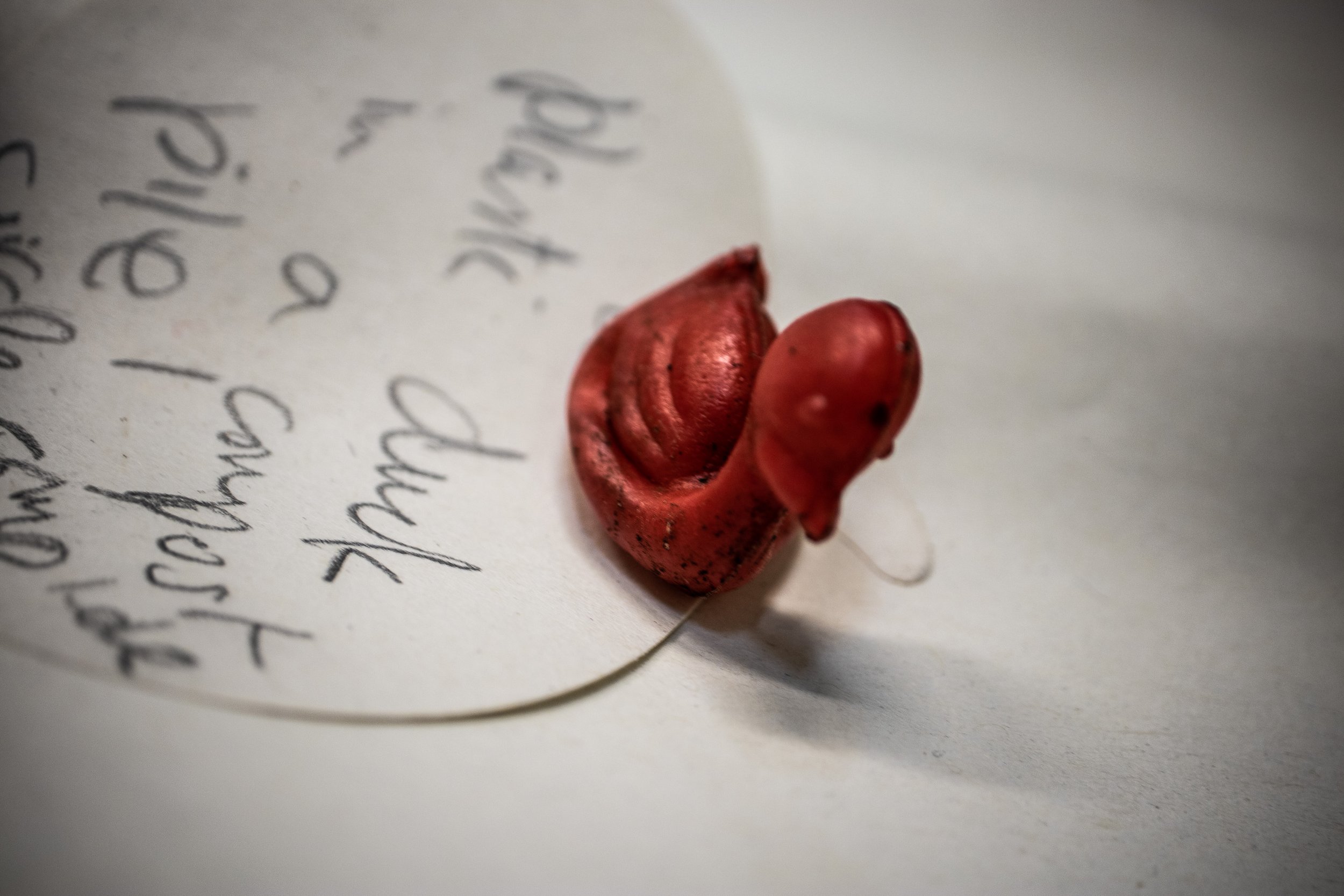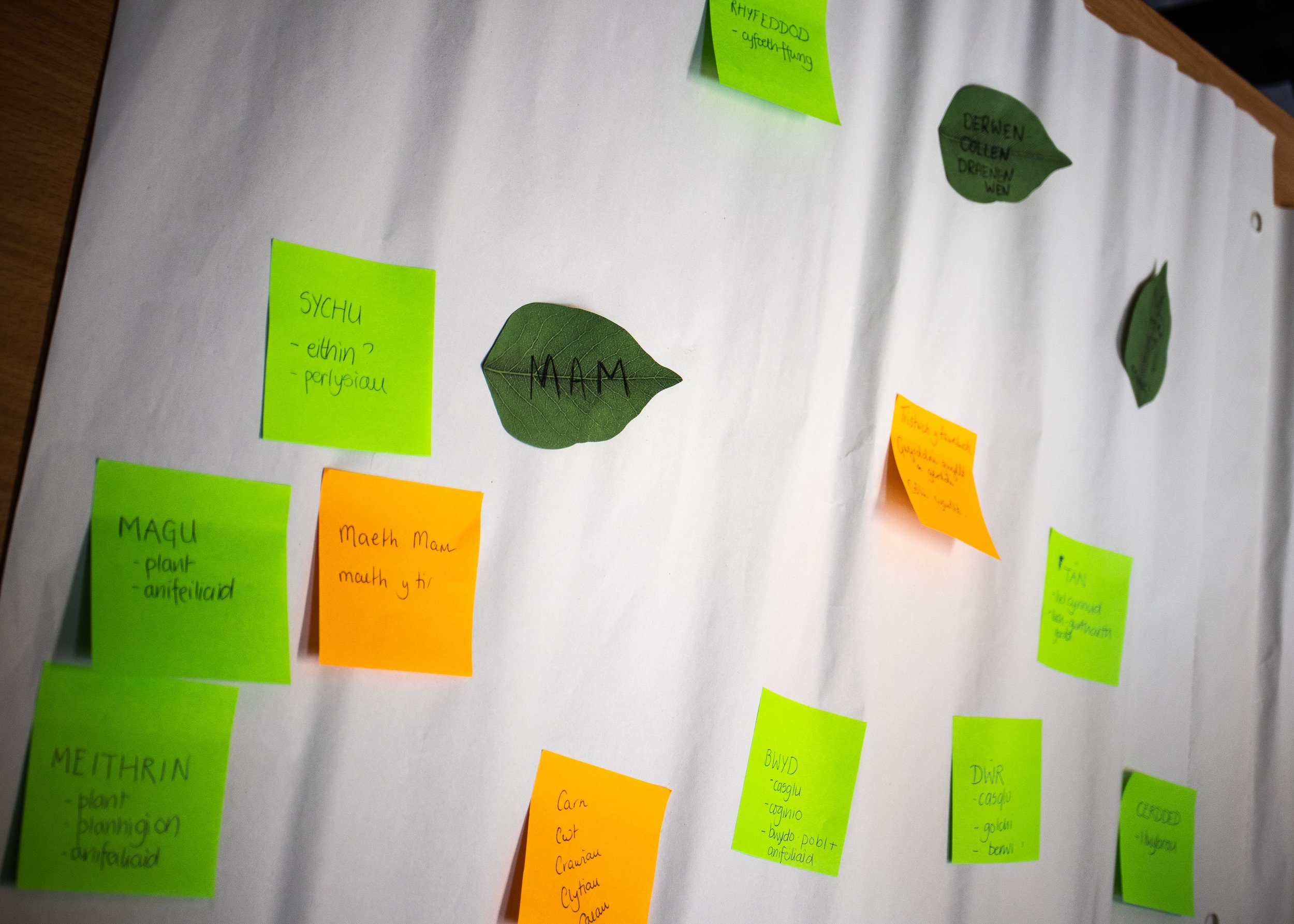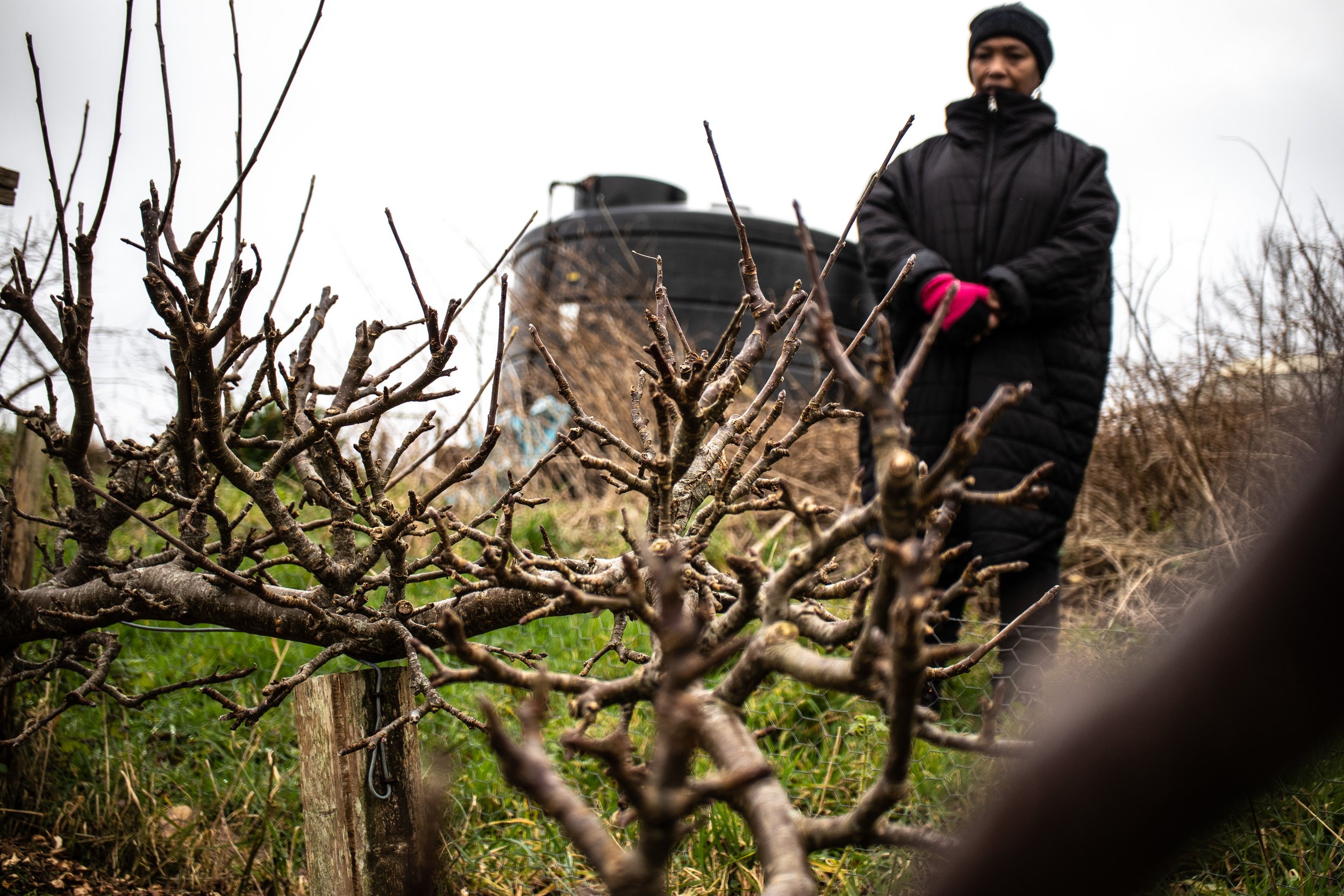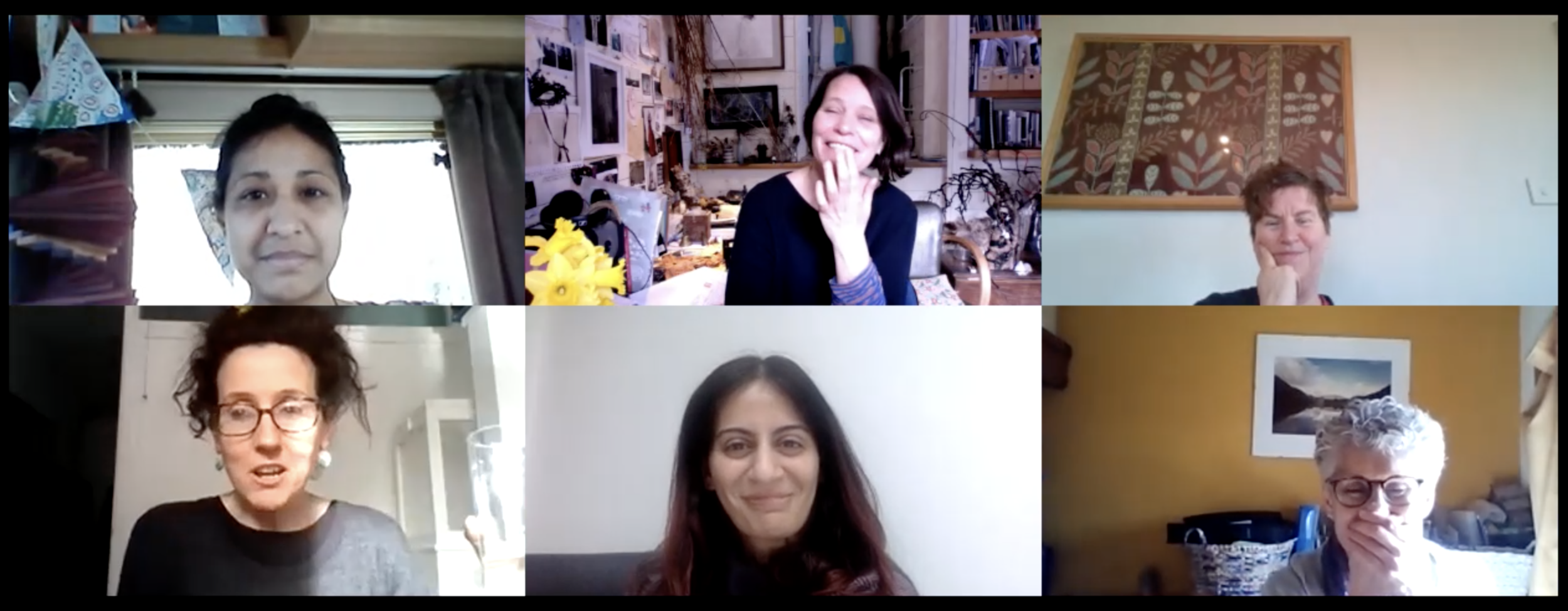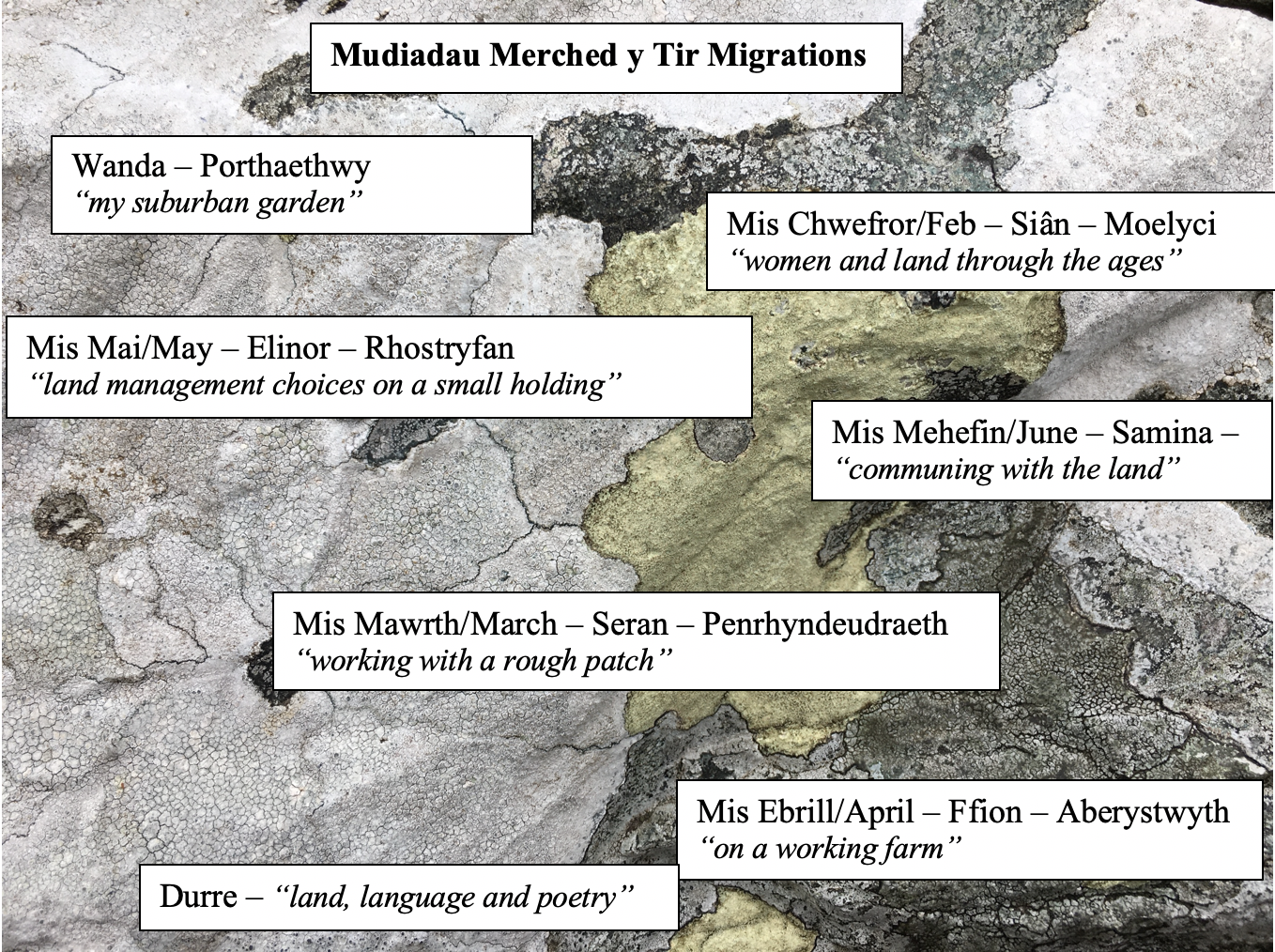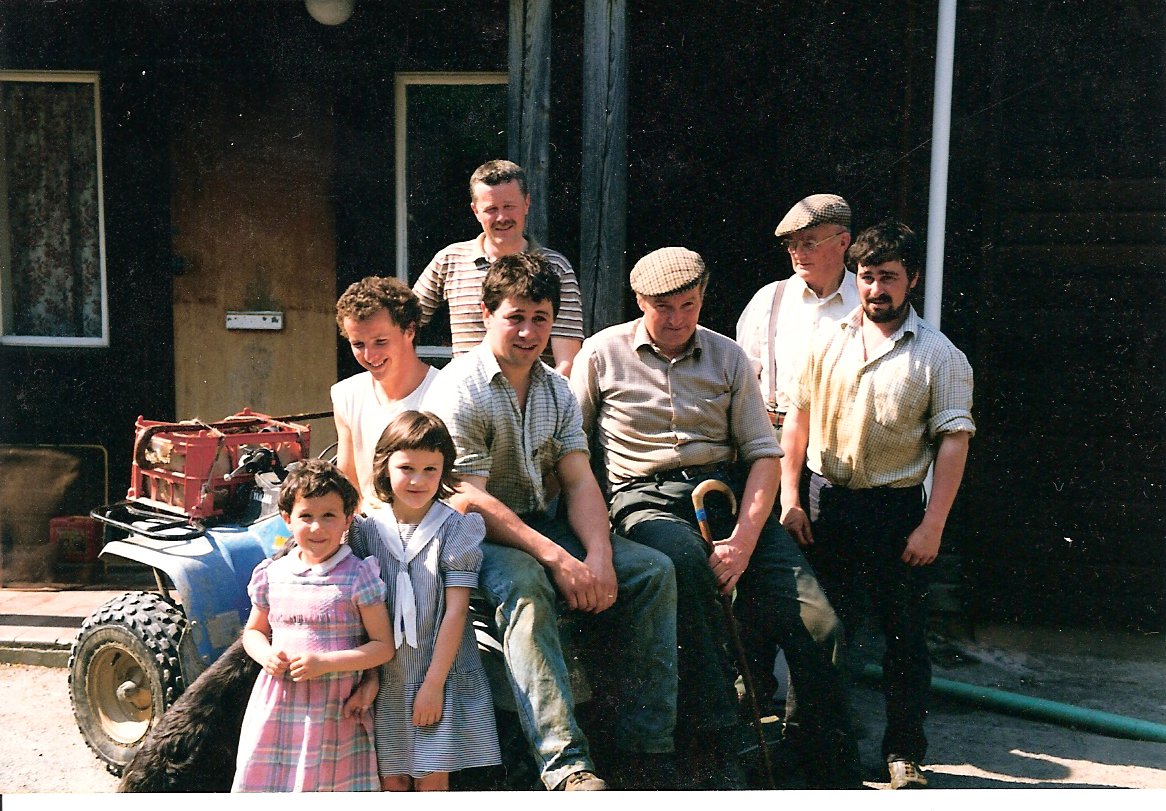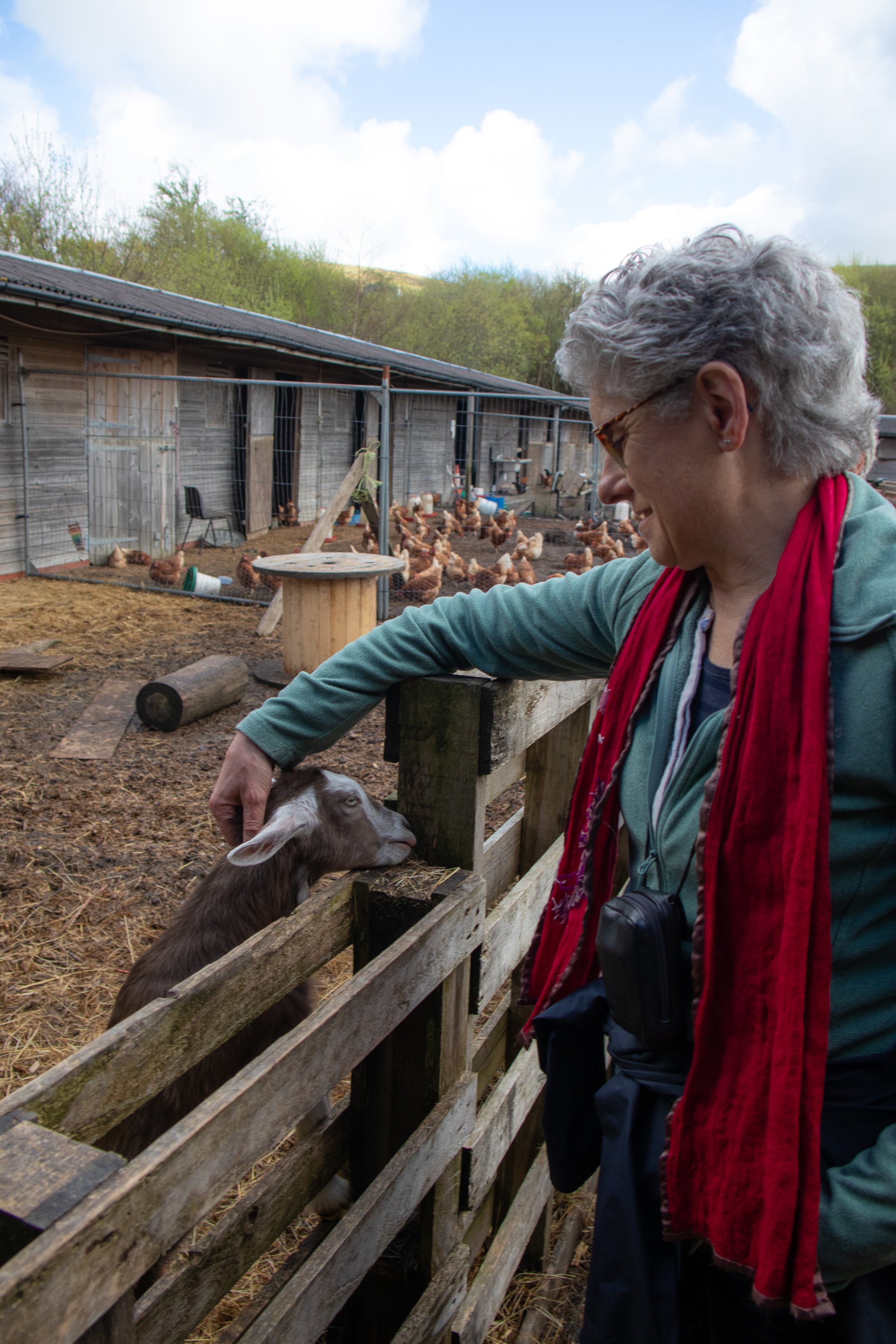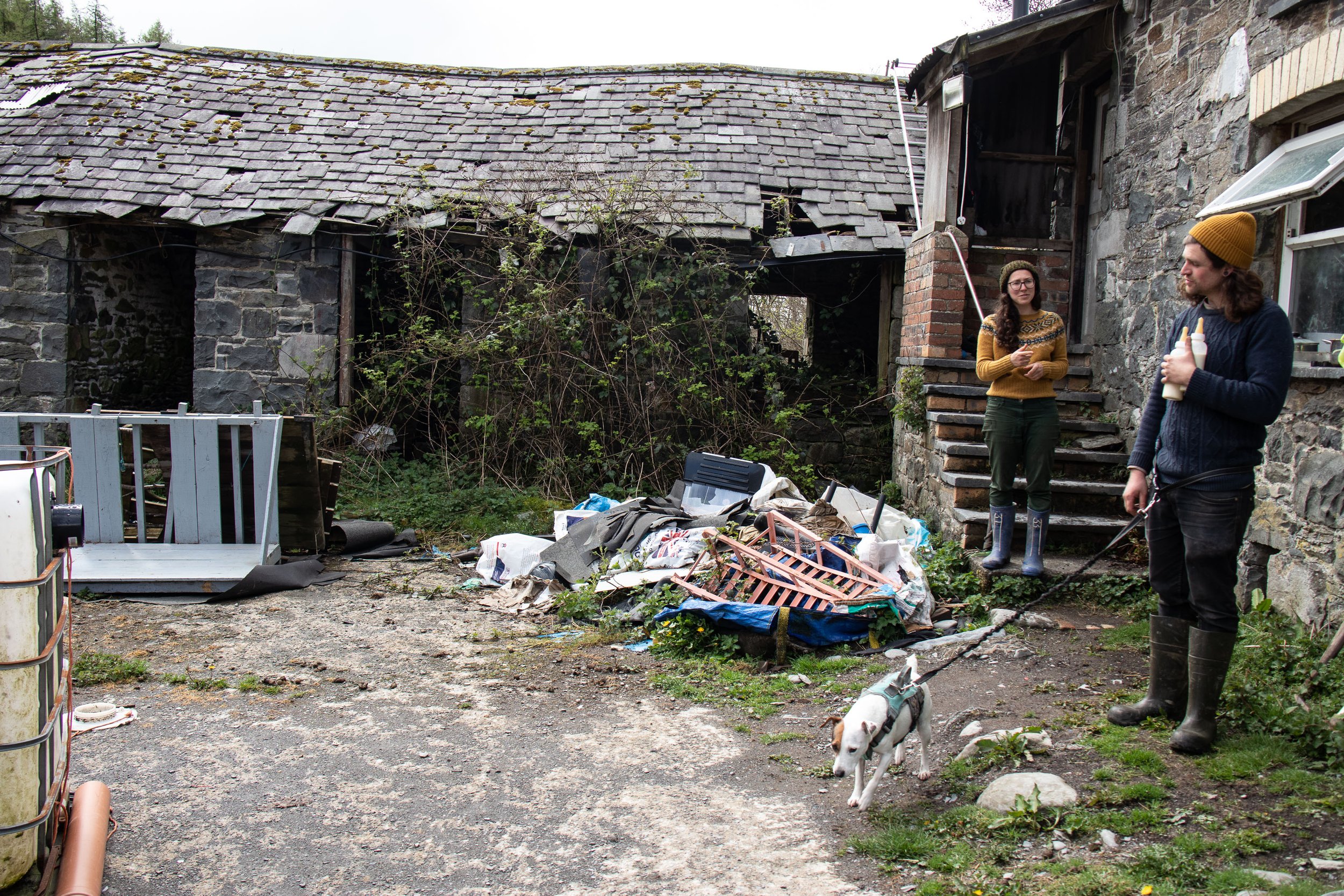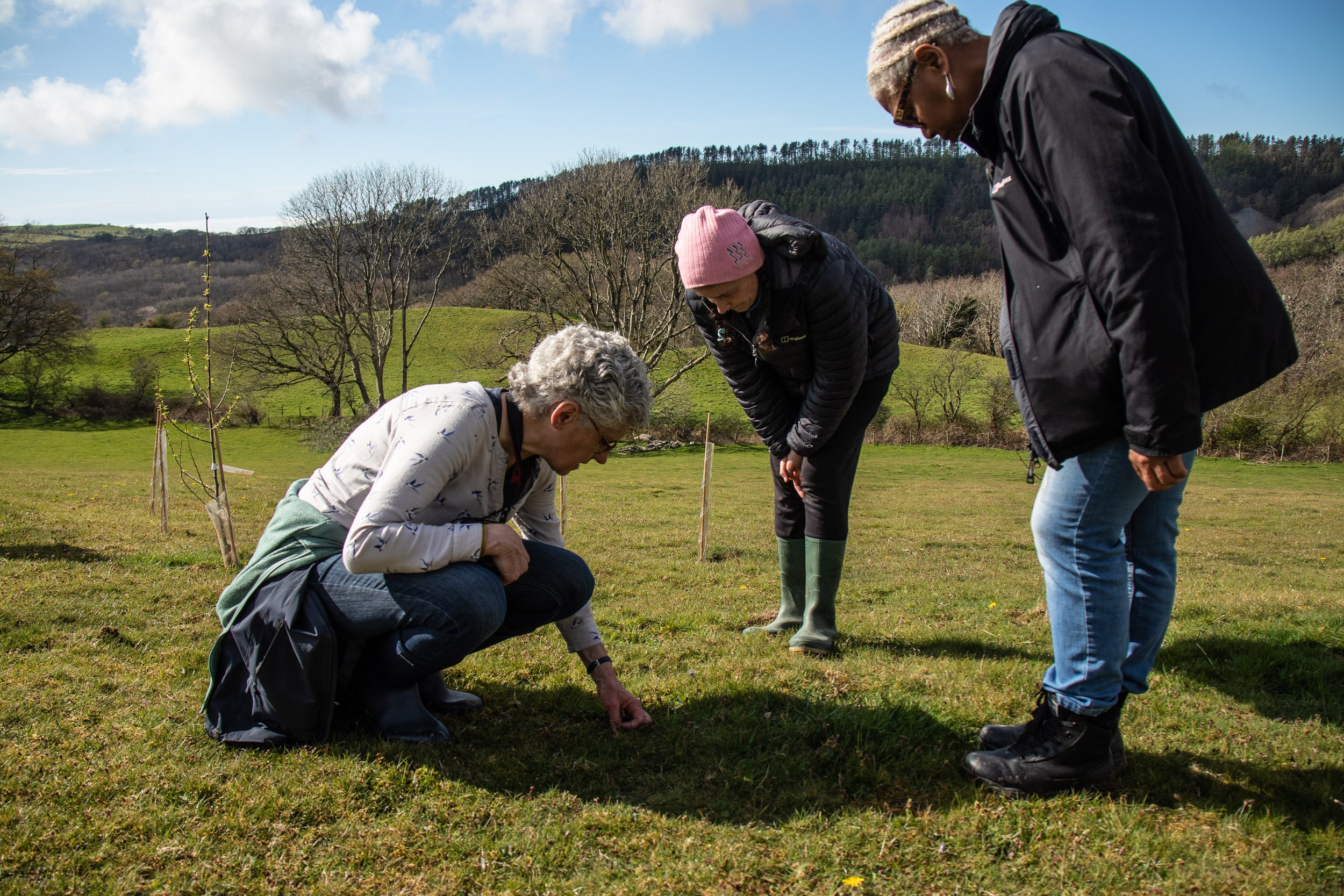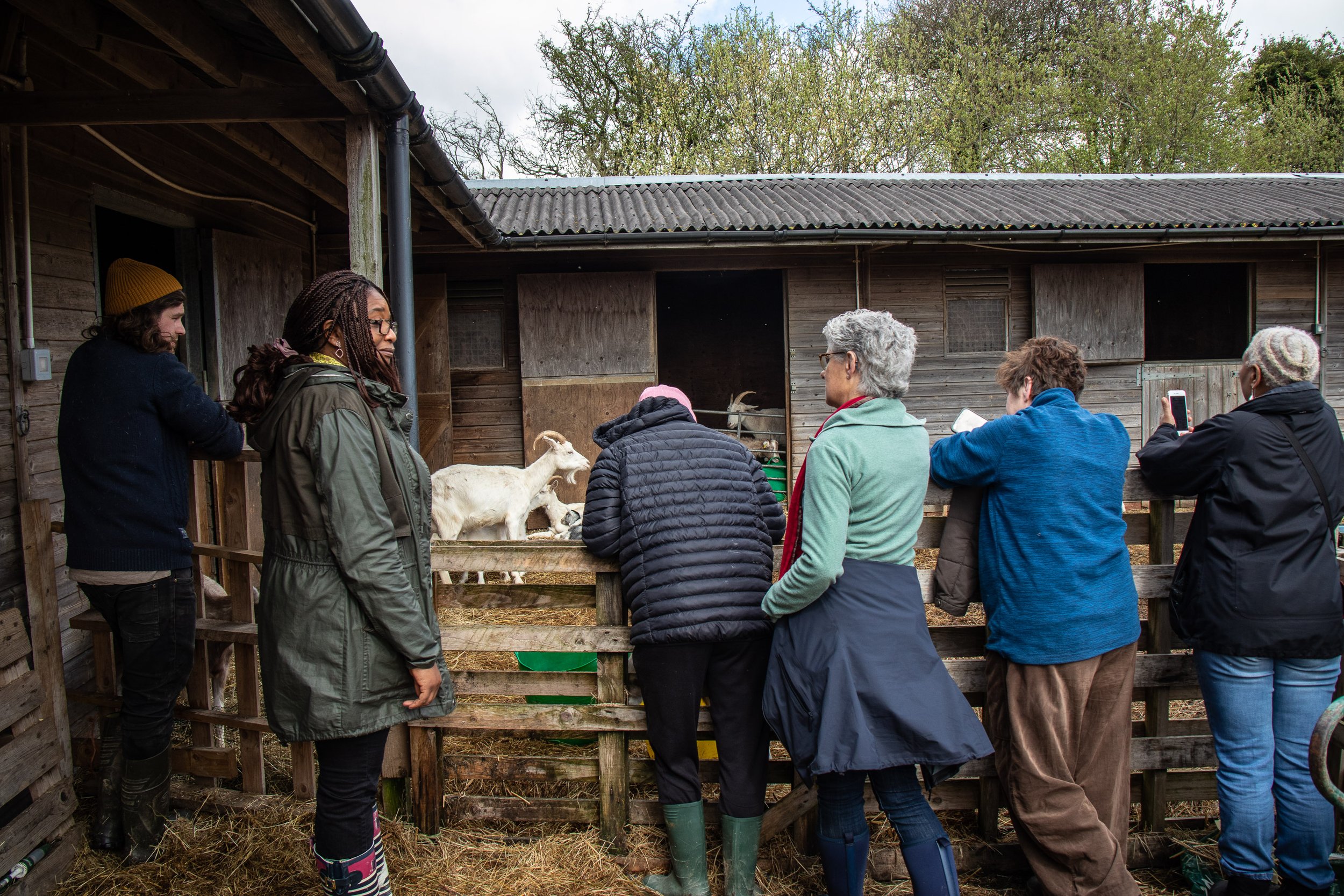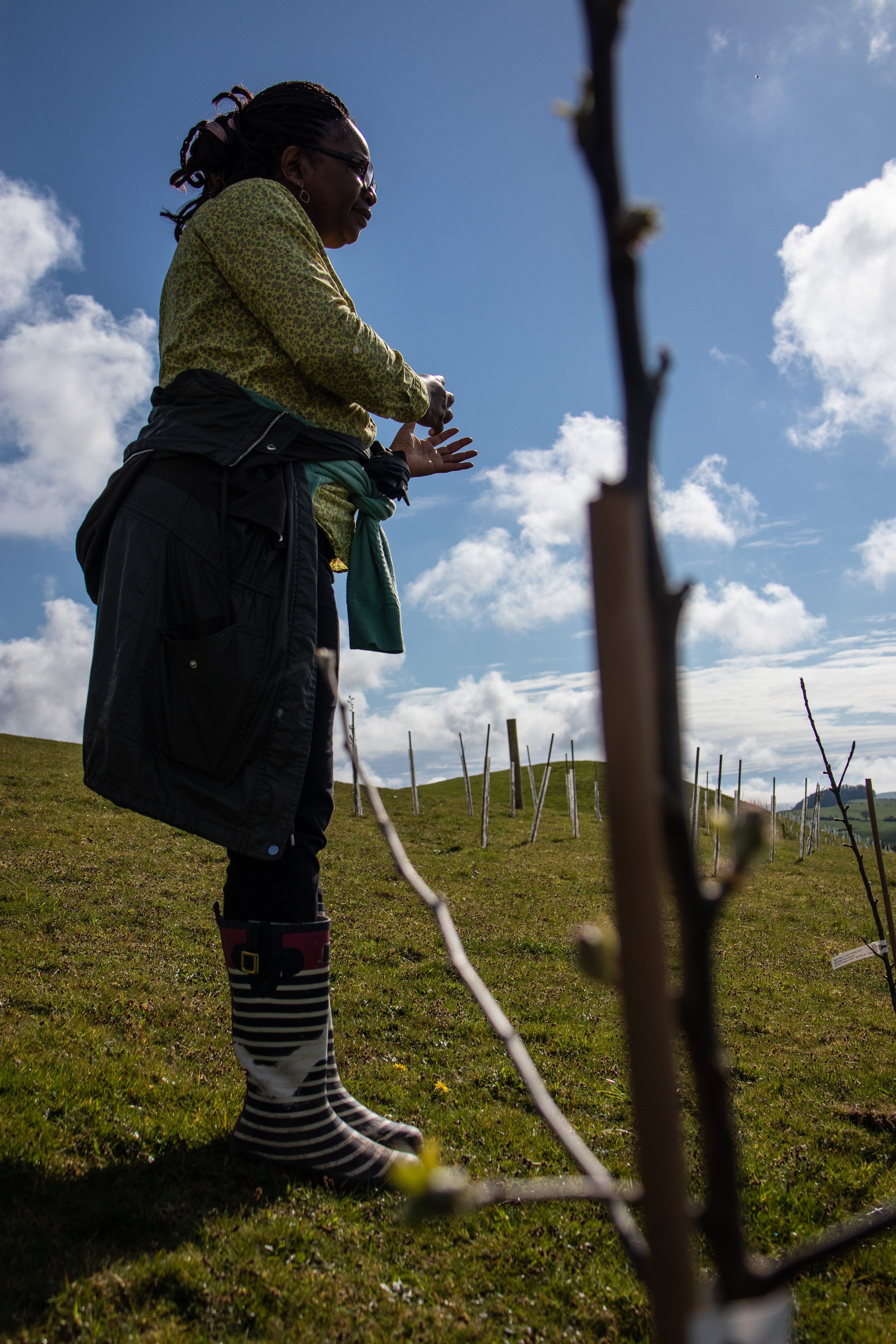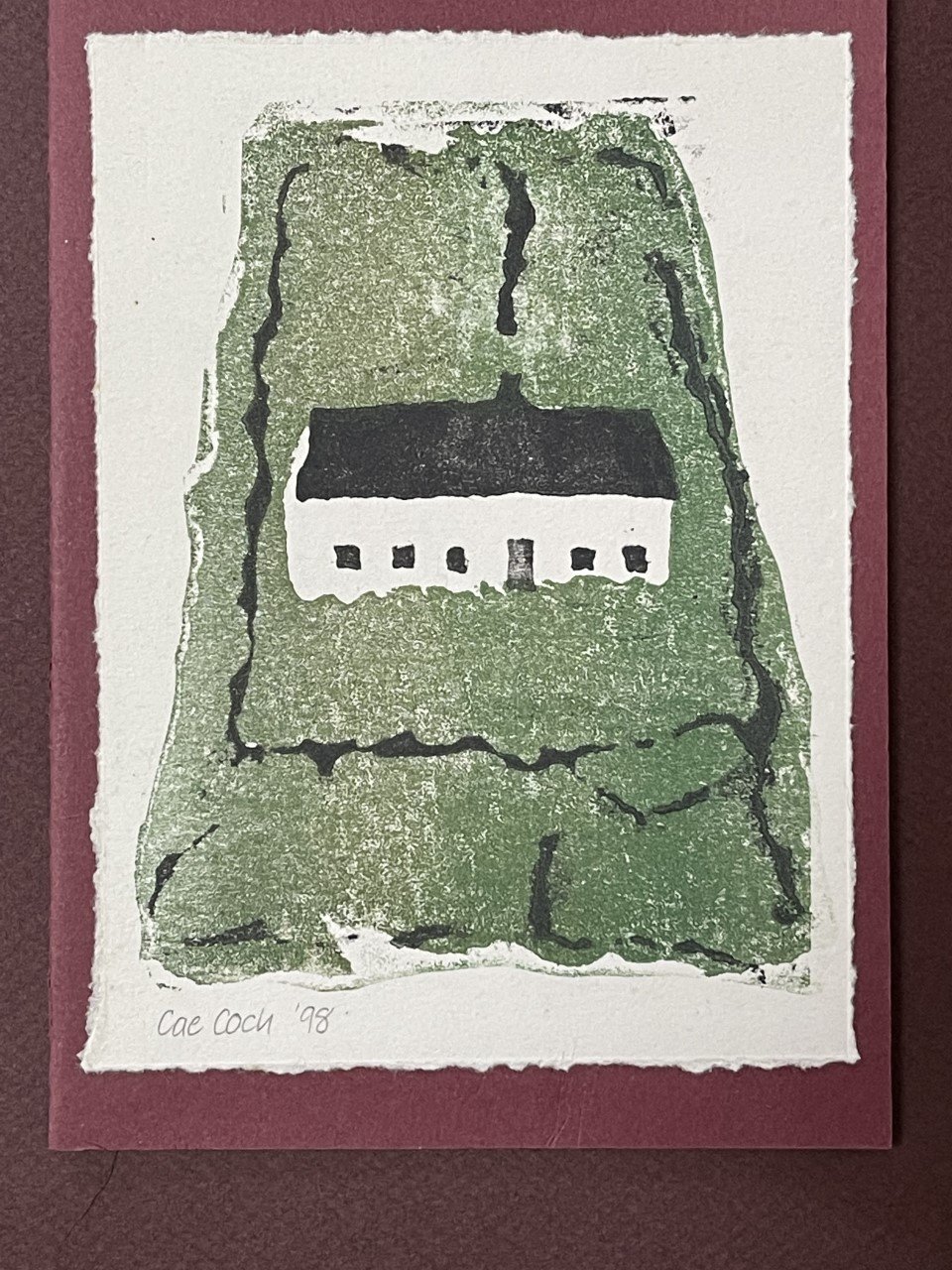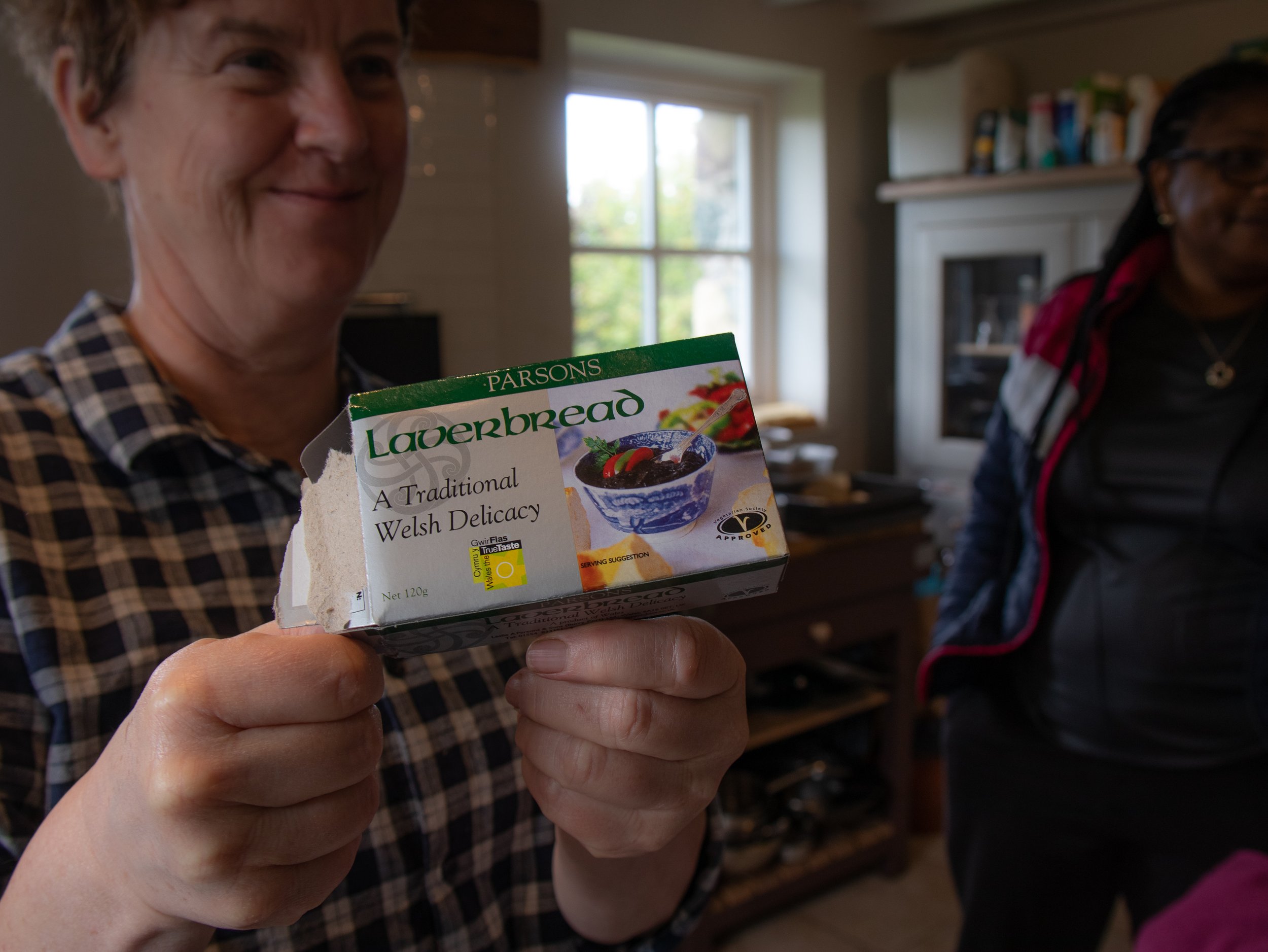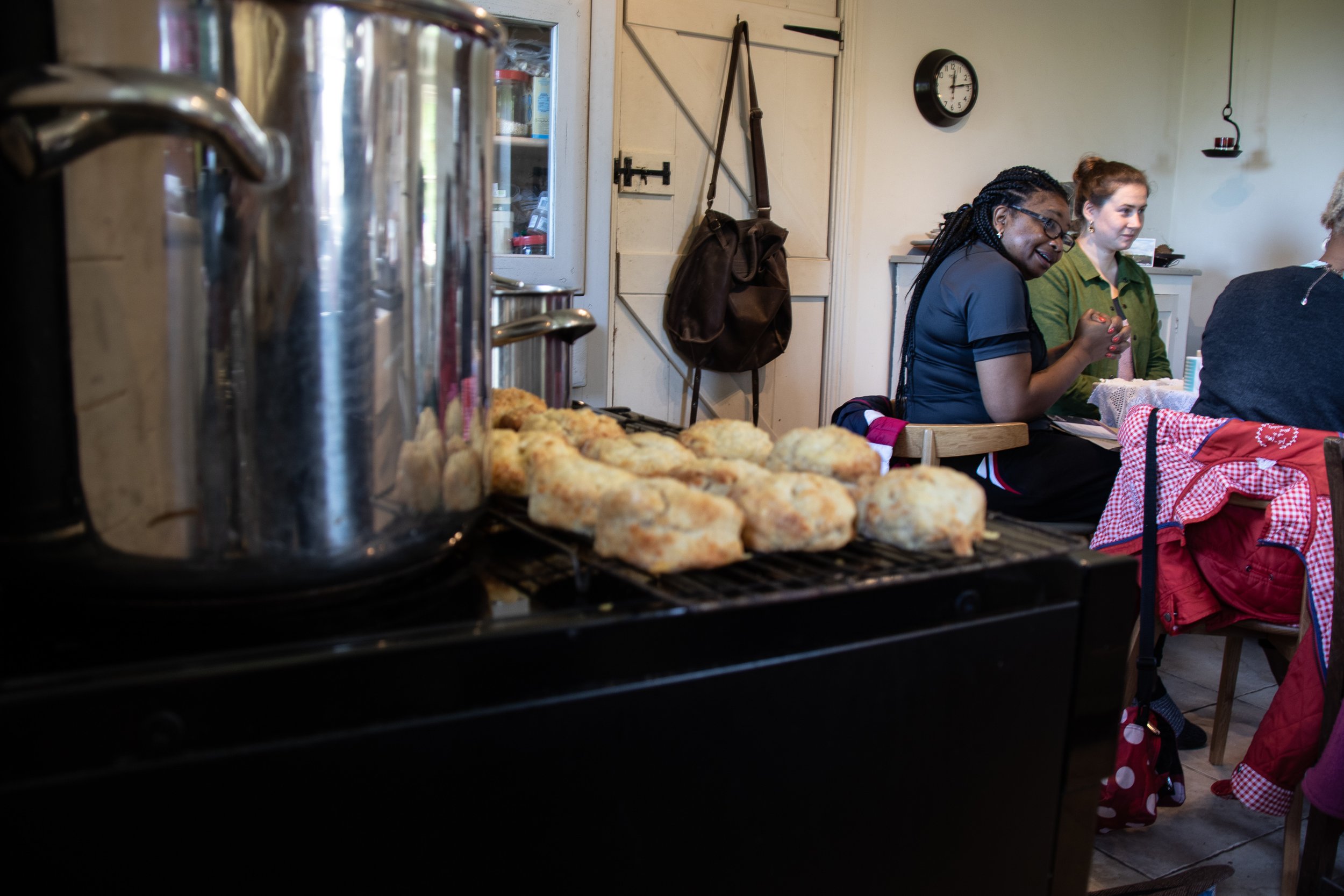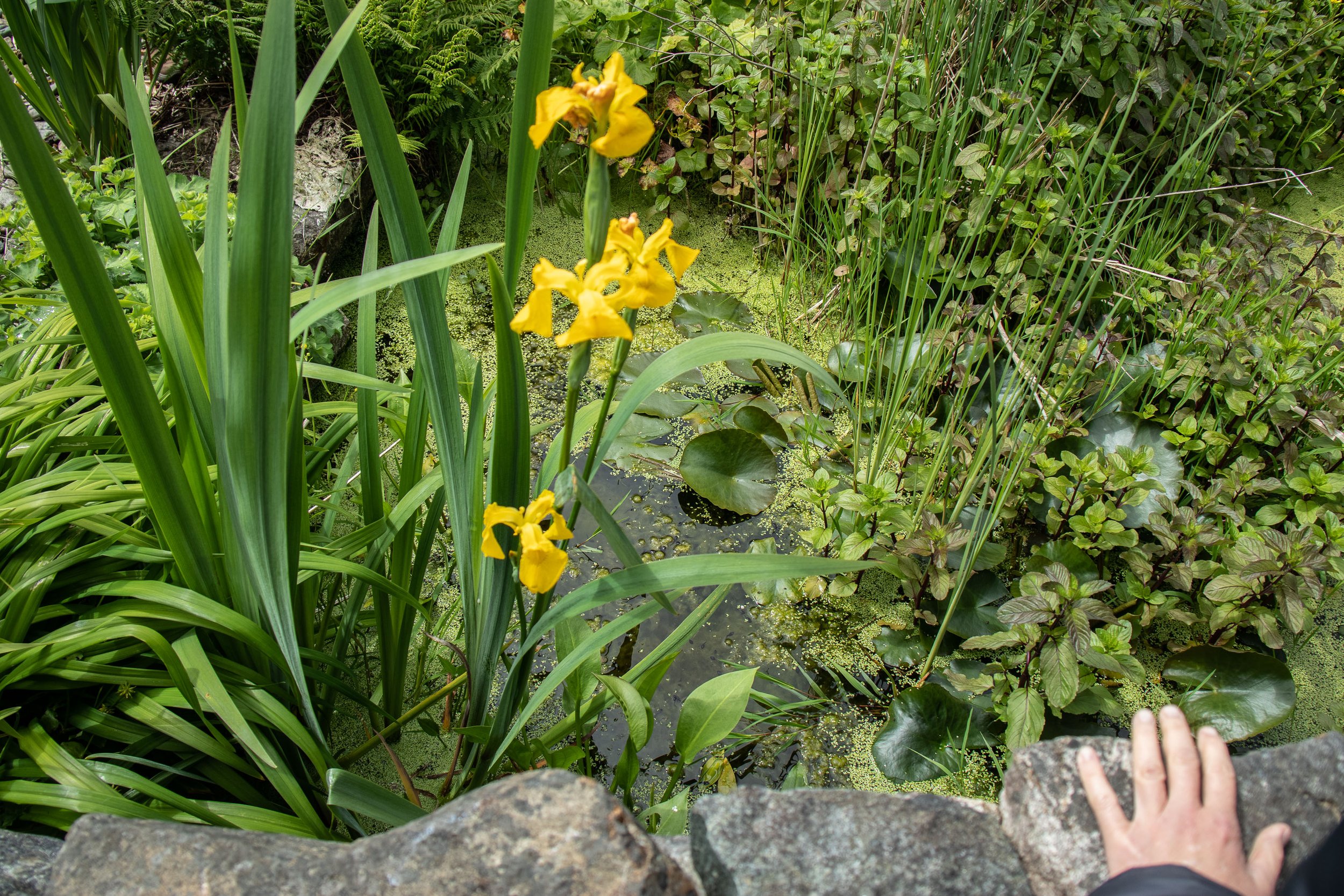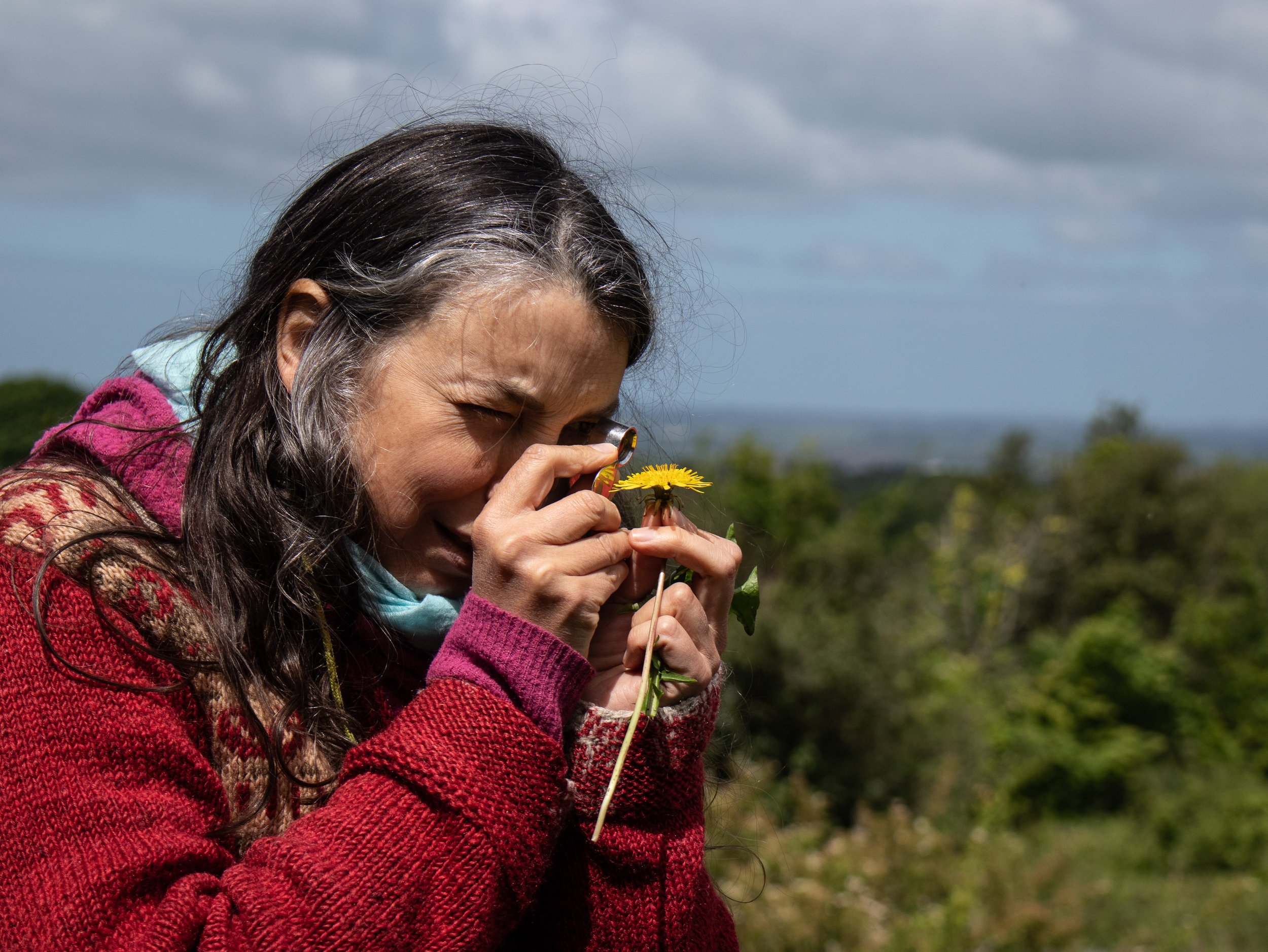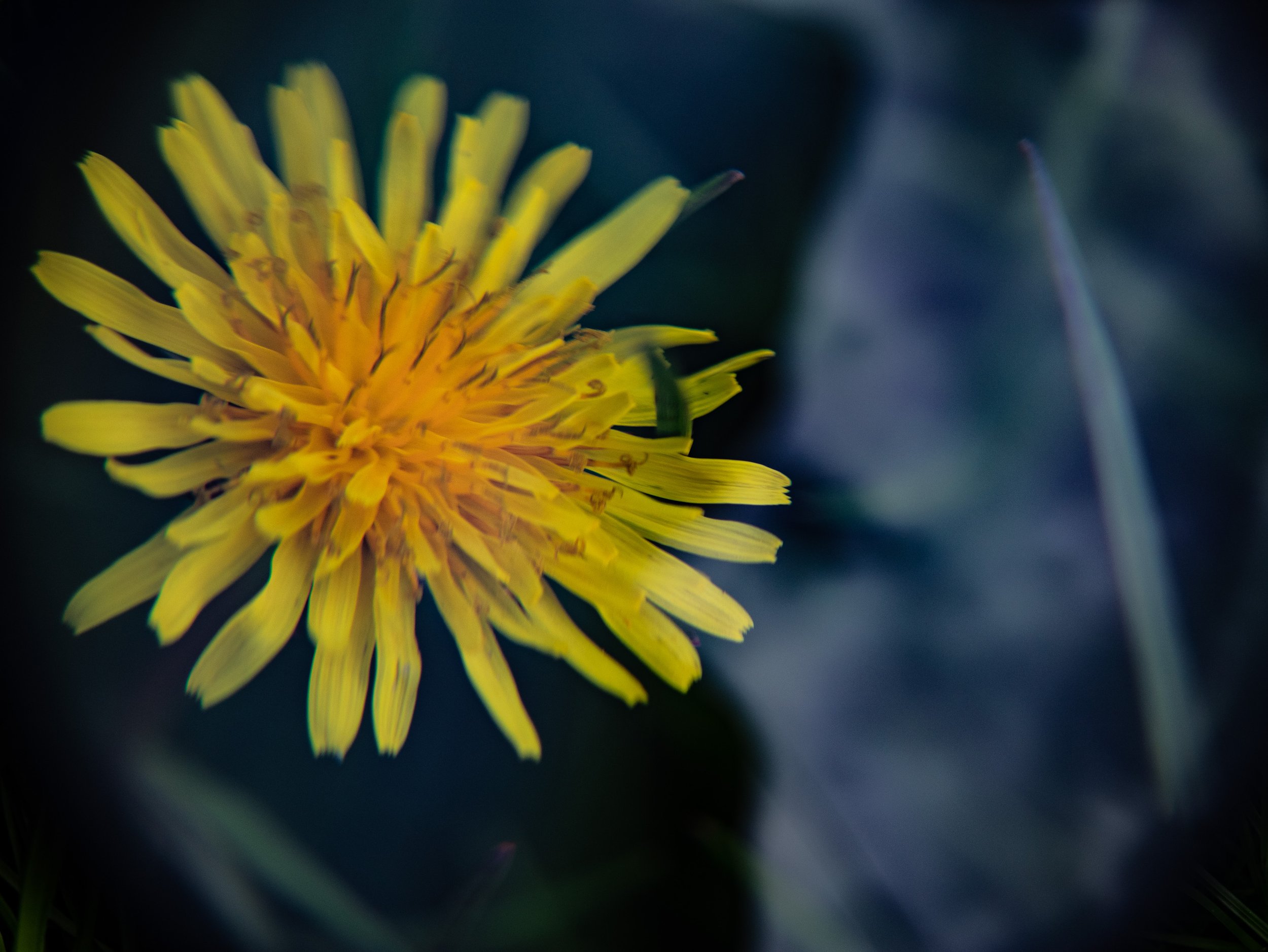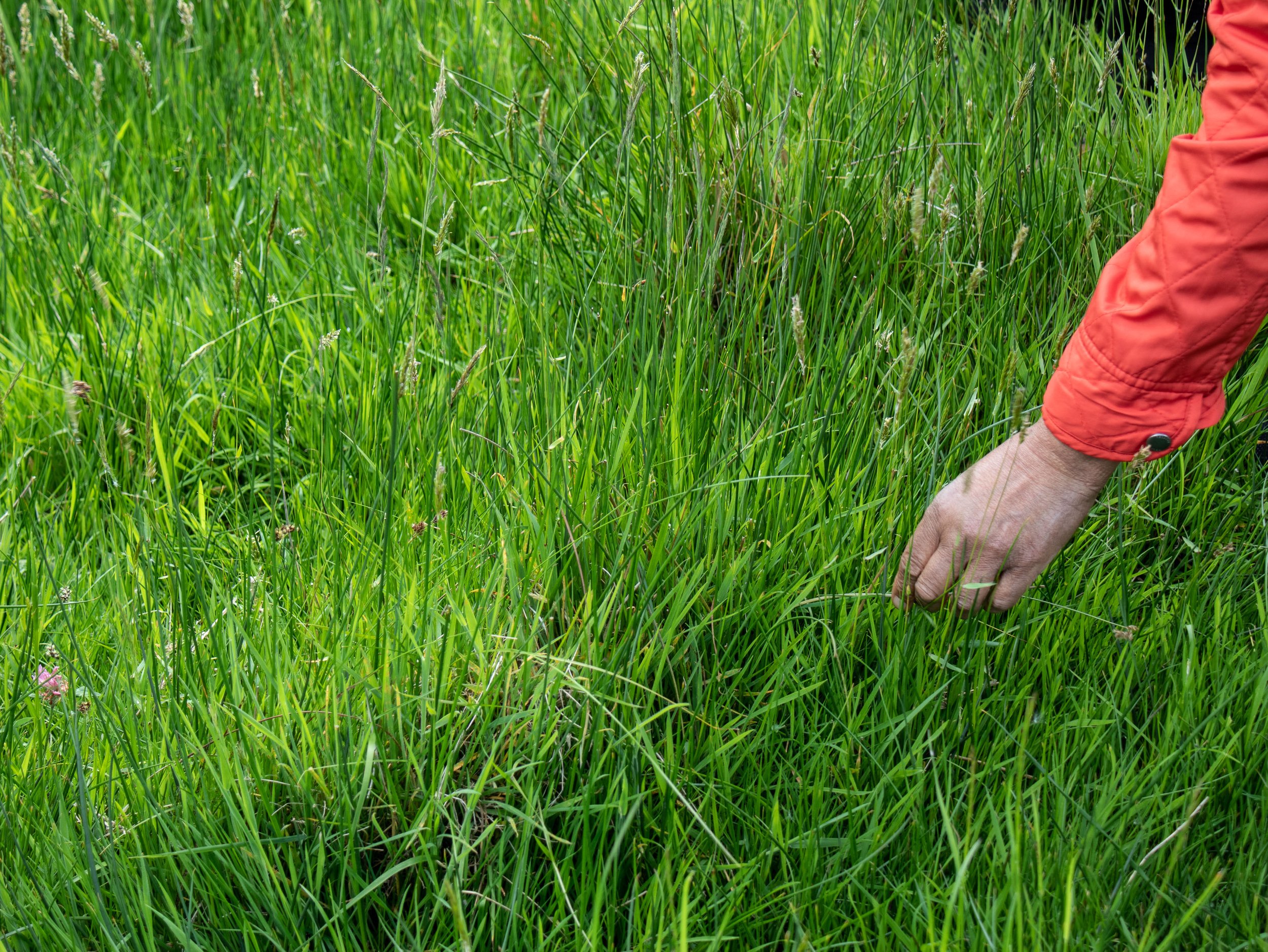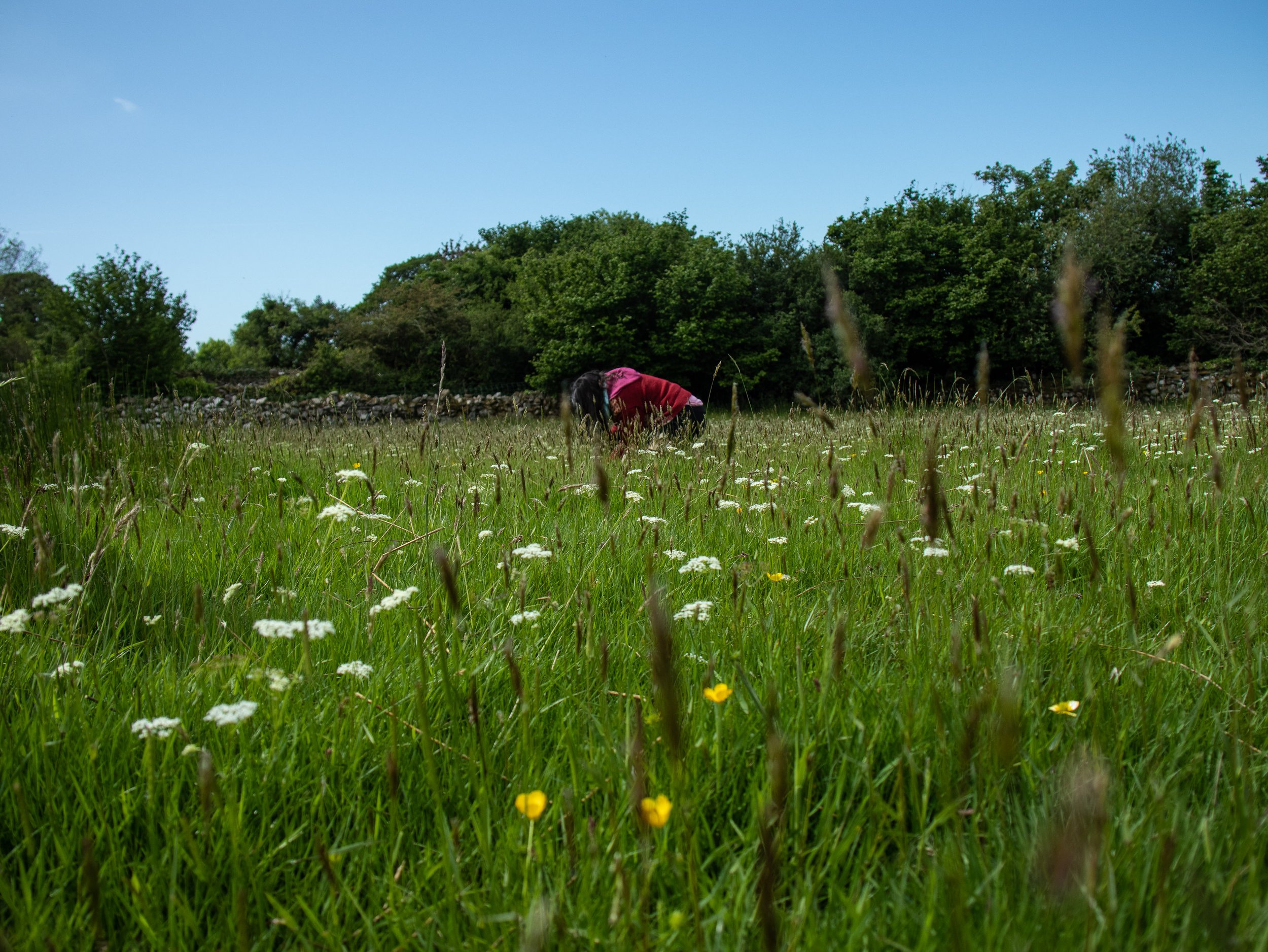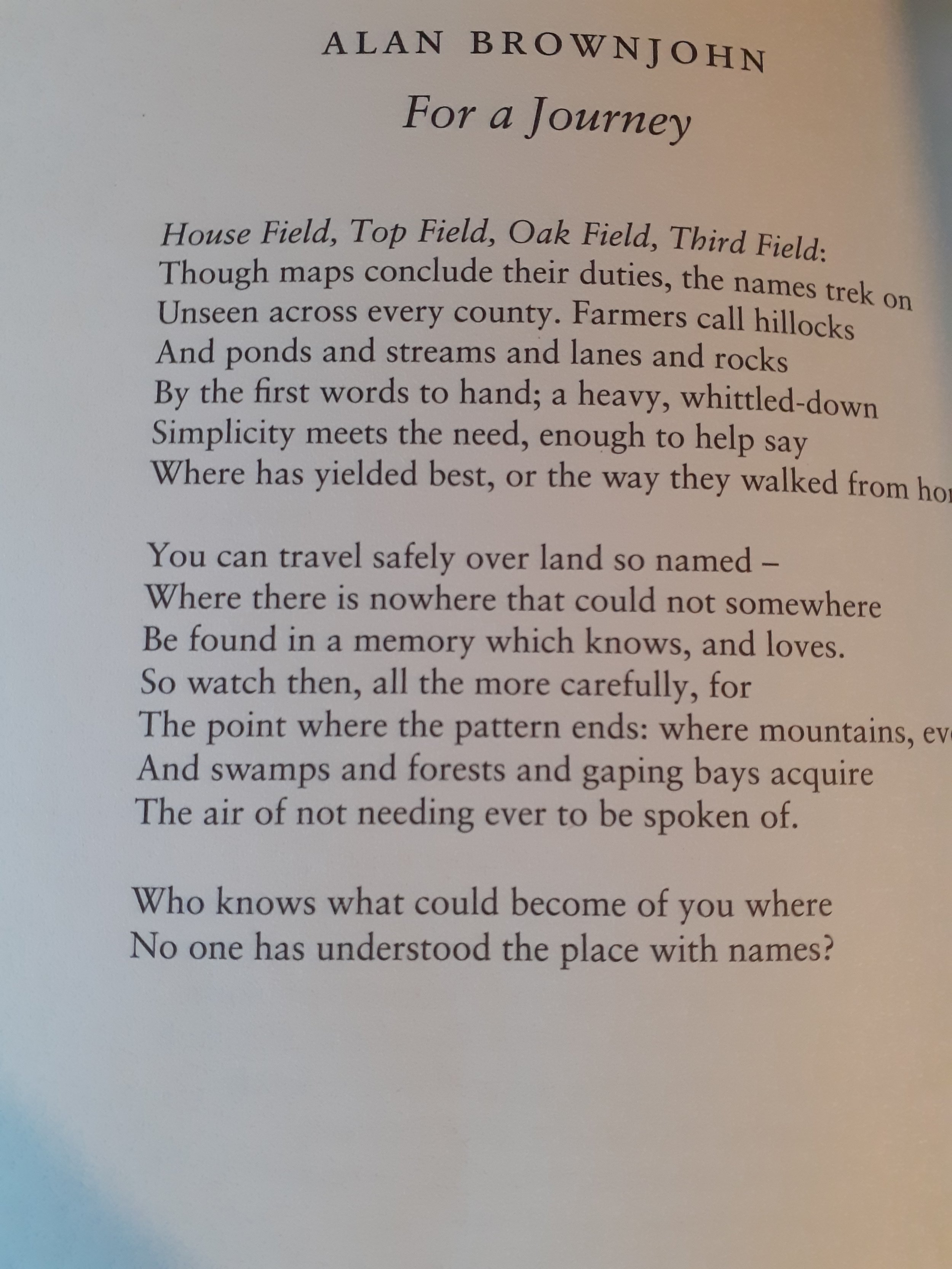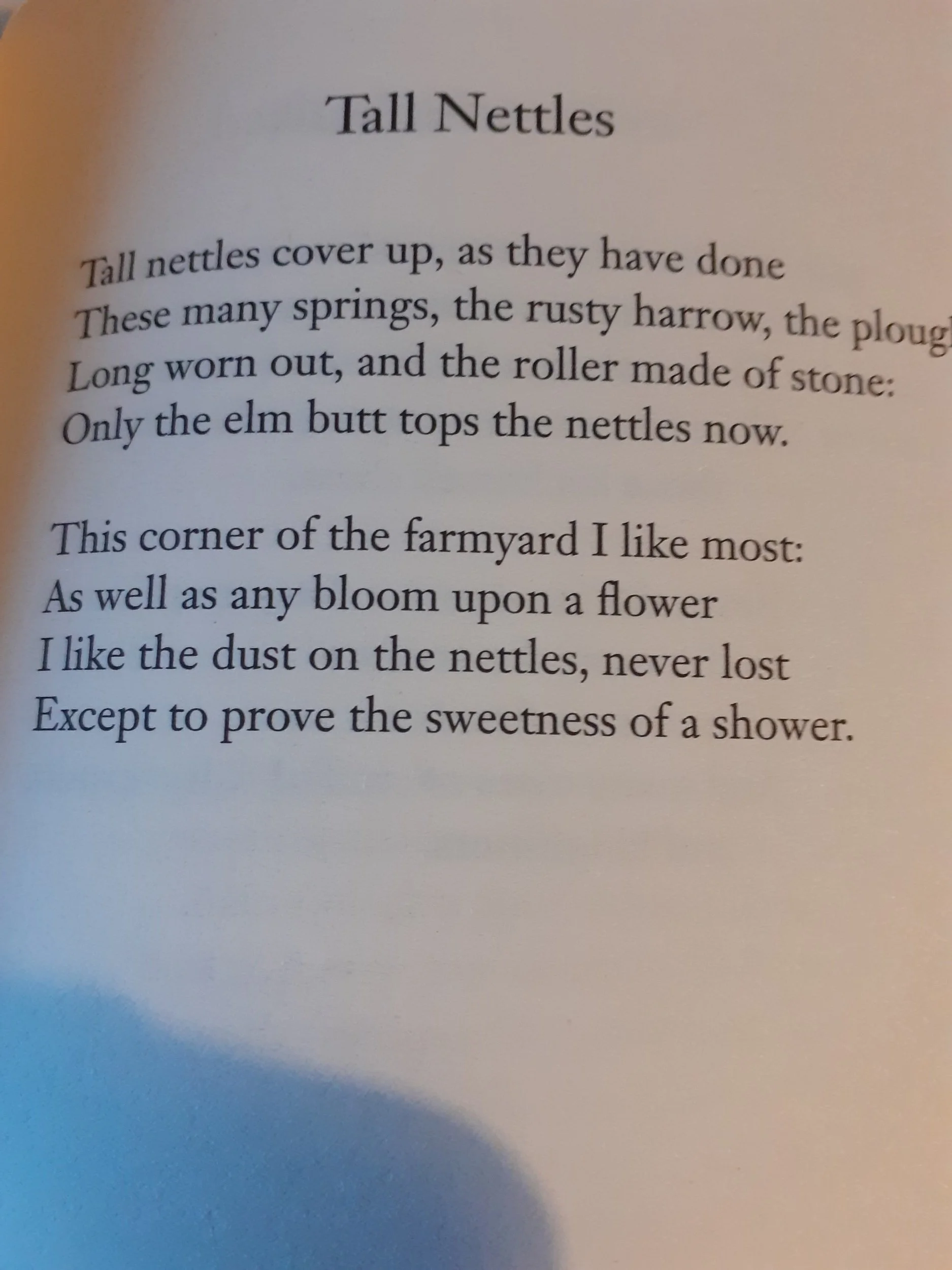
Merched y Tir
yn archwilio, mewn modd greadigol, y berthynas rhwng merched a thir – yn enwedig merched sy’n siarad Cymraeg a merched o liw – fel nôd bach posibl i drawsnewid cyfiawnder amgylcheddol a chymdeithasol
creatively exploring the relationship between women and land,particularly welsh speaking women and women of colour, as a potential mini node of transformation for environmental and social justice [Just transition]
Llun: Elinor Gwyn
Cefndir/Background
Mae’r arbrawf hwn yn archwilio, mewn modd greadigol, y berthynas rhwng merched a thir – yn enwedig merched sy’n siarad Cymraeg a merched o liw – fel nôd bach posibl i drawsnewid cyfiawnder amgylcheddol a chymdeithasol
Dechreuon ni yn Nhachwedd 2021 gan ddod â grwp bach (o tua 10) o ferched ynghyd i gael cyfarfod i archwilio’r syniad.
Yna cawsom ail gyfarfod ym mis Rhagfyr, a phenderfynu dechrau mudo ar hyd a lled tiroedd gwahanol, bob un yn cael ei gynnal gan berson gwahanol, gyda ffocws gwahanol i’w ymholi ac o bosib gyda gwahoddiad i westeion ychwanegol.
Os oes gennych ddiddordeb mewn ymuno efo ni, cysylltwch â Lindsey ar: lindsey.colbourne@me.com
This Utopias Bach experiment is an open-ended exploration, focused initially on creatively exploring the relationship between women and land,particularly welsh speaking women and women of colour, as a potential mini node of transformation for environmental and social justice [Just transition]
We started intially (November 2021) with a small group, meeting over zoom. And we decided to try moving into ‘real world’ meetings hosted by each of us during 2022. Each of these hosted meetings will be designed by the host in terms of participants, focus and activity.
Discussion, ideas and images below, a kind of note of our migrations….
Pwy dan ni? Who are we?
Audrey West
Catrin Roberts
Durre Shahwar
Elinor Gwynn
Ffion Jones
Lindsey Colbourne
Salamatu J Fada
Samina Ali
Seran Dolma
Wanda Zyborska
Siân Shakespeare
Cyfarfodydd: Meetings (3.11.21 & 16.12.21)
Agendas/Agendâu
These meetings were facilitated by Samina Ali and Lindsey Colbourne.
Rhai nodiadau a chwestiynau o'n trafodaethau: Some notes and questions from our discussions
Llun: Samina Ali
. Geiriau: Siân Shakespear
‘Dan ni’n perthyn trwy fenthyg, yn hytrach na pherchnogi cilcyn o dir
We belong through borrowing, instead of owning, a piece of land.
# What does it mean to care for land?
# Generating connections with land without ‘ownership’
# Access to land - social justice - space for (human and non-human) survival and wellbeing
# Learning to ‘Share the land’ – eg curlew and farmer ‘I’m trying to survive here and the Curlew is too’
# Working with tiny pieces of land, growing and collaborating with plants (and the successes and failures)
# exploring and knowing the local
# gerdded llwybrau lleol yn ddiweddar gyda fy mab bychan: walking local paths with my baby son ['Minor Walk Manifesto' - Alec Finlay]
# Succession – noticing/documenting changes over a year on a particular piece of land
# Spiritual, emotional and physical relationship with the land – ceremony and ritual
# Embodied presence. Flamenco – grounded, with spirit – Flamenco travelled from India to Spain
# Trauma of colonial legacy – (non-Welsh speaking) people coming again to do things to the land without asking eg recent ‘industrial’ take over of farm land to plant conifer forests
# Friends of farmers – could we try new ways to make connections between women farmers and non-farmers (eg incomers who often try to buy land), providing opportunities for non-farmes to be on/do something with/ collaborate /understand/learn about the land (potentially bringing income to farmers/helping them to stay on their land)?
Llun: Audrey West. Geiriau: Siân Shakespear
Pan yn crwydro o’n cilcyn o dir, ein gwreiddle, mae darnau o diroedd eraill yn asio efo ni a rydym yn ein tro yn gadael darnau ohonom mewn tiroedd eraill.
When we wander from our piece of land, our rootplace, other lands become assimilated into us and we in turn leave pieces of us in other lands.
# Nomad (choosing to move – refugee (forced to move) – rooted (never want to move)
# Roots – in a place, when we wander from our root place, other pieces of land become assimilated
# Women’s history and land in different cultures e.g. Jamaica and woman being the main workers of the land, woman not allowed direct connection / “ownership” of land and space – or more accurately to belong to land
# Working land for survival -/- Growing/care of plants (mango, lemon)
# Syrian refugees - no place to grow food; homeless friend - no place to live: https://www.fourthland.com/echoes-of-the-dancing-sky
# Moving around in response to call of the land
# Home, culture, history, assumption of race – what is an ‘outsider’: Genes, people and languages
# Re-emplace ourselves in country
# Connection to piece of land as identity – retaining or developing sense of identity even though distanced/estranged from land
# Going back to land you’ve left
# Displacement from land/ local and intergenerational
# Feeling foreign to land moved away from
# Language and land and placenames
# Cynefin: Journey –territory or air or spirit in common is what makes us human. Where we belong or in between.
# Ancestral land – rebuilding the ruins (tiny slate houses)
Llun: Imbue Scrolls. Geiriau: Siân Shakespear
Beth am chwilio am a gwrando ar leisiau merched y tir yng Nghymru?
Lle mae nhw? Why not seek and listen to the voices of women of the land in Wales? Where are they
# Y gwawn sydd yn ein cysylltu efo’r tir – tenau ac anweladwy …ond yn anhygoel o wydn.
# The gossamer which connects us with land – so thin as to be invisible ….but so tough.
# Yng Nghymru mae lleisiau merched y tir yn fud, ar y cyfan ond yn Jamaica, a llawer o wledydd eraill merched sy’n trin y tir. Arferai hyn fod yn wir yn llawer o froydd chwarelyddol y gogledd
# In Wales the voices of women of the land are mute, on the whole, but in Jamaica and several other countries women work the land. This used to be so in many of the slate quarrying areas of North Wales.
Llun: Wanda Zyborska
# “Maith Natur” – collaboration with plants (making balms etc); knowing the plants; traditional uses
# Connection to land through women and pregnancy
# Connection to land and culture
# Poetry and land
# Femininity, sensitivity and land
# Spiritual connection to the land
# Particular culture of men and land
# Yw merched yn fwy debyg o ofalu am, a meithrin y tir na’i dreisio, neu ydy dynion yn gweld ac yn trin y tir mewn ffordd tebyg?
# Are women more likely to care for and nurture the land than rape it, or do men see and treat the land similarly?
# Listening to the land. Direct conversation with the land and our intrinsic nature
# Doing something collectively - Open and whatever someone wants to explore – some connection with ‘your’ or another land you want to explore – experience through someone else’s lens
# Could we be like mycelium?
Llun a geiriau: Siân Shakespear
Gwirioneddau/cwestiynau byd-eang - universal truths/principles
Yw tir yn dir heb iaith?
Yw iaith yn iaith heb dir?
Beth yw tir heb bobl – merched neu ddynion?
What is land without language?
What is language without land?
What is land without people – men or women?
Llun: Lindsey Colbourne
“The power of solidarity with the plants is that with just a bit of soil and one seed, we can begin the work of transformation. We can activate processes to heal the planet”
- Dr Natasha Myers
Be’ sy nesa? What’s next?
# Interest expressed around meeting 4-6 weekly
Llun: Wanda Zyborska
# Idea of migrating into each person’s physical land / space connection as a way of deepening and developing this theme that has brought us together
- This could involve (each of us) hosting on any land of your choosing, whether in your garden or a piece of land that you have a specific interest in, or feel strongly connected to, or perhaps that you feel excluded from
- The activity, focus and people would be entirely up to the person hosting – something you’d like to explore collectively.
- It could involve inviting others from outside the group
- How long the ‘visit’ would be would be up to the host (could be short or longer), and perhaps include some virtual aspect if some people can’t make it.
# By hosting/visiting each other in our different lands, we would have a framework for collectively exploring these different aspects and interests. In this way we’d get to experience different ways, contexts, women and their connection to land and opportunity for little ‘experiments’ eg
# Siân - Moel y Ci
# Elinor – Olyniaeth: Succession, noticing and responding to land over a year eg starting in January: does this link to the Utopias Bach Succession project hosted by Julie Upmeyer?
# Audrey: Creating a tropical fruit orchard
# Wanda: Connecting with trees
# Lindsey: Friends of farmers – could we try new ways to make connections between women farmers and non-farmers (eg incomers who often try to buy land)
We also talked about funding, and whether Utopias Bach could provide some basic funding for travel expenses for those travelling furthest (and help organise home stays perhaps), as well as a fund for ‘hosting’ of say £200 each time. It may also be that funding applications to external organisations could be made for specific hosting events, or that as the work progresses, we find a way of fully funding our time.
Each of us could start forming ideas for ‘hosting’ (but no requirement to do this!)
Cyfarfod nesa: Next meeting
Sian will host the next meeting at Moel y Ci, Tregarth end Jan/early Feb.
Cyfarfod Moelyci Meeting 25.1.22
hosted by Siân Shakespear
Efo Audrey West, Catrin Roberts, Elinor Gwynn, Lindsey Colbourne, Salamatu J Fada, Seran Dolma, Wanda Zyborska, Siân Shakespeare
Meddyliau tra’n crwydro /
Thoughts during wanderings
(diolch i Siân Shakespear a Wanda Zyborska)
Merched yn cefnogi ei gilydd ar randiroedd / Women supporting each other on allotments
Dychwelyd i'r tir ar gyfer bwyta ac i gysylltu / Returning to the land for eating and bonding
Rice pyramid - Nigeria - self sufficiency, return to land (and investment in land by companies) - parallel with industrial tree planting in Wales?
Gwrthdroi'r amgau tir - dad-drefedigaethu / Reverse the enclosure – decolonising
Arbrofion merched /Women’s experiments - no straight lines, growing things that ‘shouldn’t grow’
1 erw er mwyn bod yn hunangynhaliol /1 acre to be self-sufficient
Trychineb adeiladol / Constructive catastrophe
Gall sgyrsiau achub y byd /Conversations can save the world
Beth am i ni i gyd gael mynediad at dir i’w ffermio / What if we all access land to farm?
Merched yn rhedeg tyddyn ac yn dad-drefedigaethu tir / Women running a small holding and decolonising land
Newid araf - adfer bach / Slow change – restoration ‘bach’
Sylwi ac arbrofi / Noticing and experimenting
Patio teimladwy / Poignant patio
Pili-pala wedi cwympo = merch / Fallen butterfly = woman
Coed sydd wedi goroesi / Surviving trees
Merched yn marw / Dying women
Gerddi a chwn - plastic du a phlanhigion / Gardens and dogs – black plastic and plants
Cennau a mwsoglau / Lichens and mosses
Llysiau'r ysgyfaint / Lungwort – Lleucu/Louise
Cawl Suran / Sorrel soup
Y tir sy’n rhoi - hwyaden blastic mewn domen dail - hen ddol frawychus ar fryn moel - cwblhau'r cylch / The giving land – a plastic duck in a compost pile – a scary old doll on a bald hill - completing the circle
Atgofion o adref a darnau eraill o dir / Reminders of home/other pieces of land
Ydych chi'n gallu cael sbeis o Lawrwydden? / Do you get allspice from Bay?
Jamaica - - - gorse and coconut - - - > and home Barmouth
Arogl cnau coco o eithin / The smell of coconut from gorse.
Is this a vine or a fruit tree? /Ydy hon yn winwydden neu’n bren ffrwyth?
Dalawaja (Nigeria)/Moelyci(Cymru)
Cerdded – llwybrau/walking – footpaths
Tân – hel cynnud – llwch – cwrtaith i’r ardd/ Fire – gathering fuel – ash – good for gardens and allotments
Dŵr – casglu, golchi, berwi/ Water – gather, wash, boil
Tristwch y tawelwch / the sadness of the silence (where are the sounds of the farm?)
Gwyrddni gwyllt a gerddi / Green wilderness and gardens
Colli cyswllt / losing the connection
Rhyfeddod – cyfoeth ffwng/ Wonderment – fungal richness
Derwen – collen – draenen wen/ oak – hazel - hawthorn
Mam – mother
Styfnig fel mul – stubborn like a donkey
Maeth mam – maeth tir / Mother’s nourishment – land’s nourishment
Sychu – eithin – perlysiau/ Drying – gorse – herbs
Magu – plant – anifeiliaid/ Rearing – children – animals
Meithrin – plant – planhigion – anifeiliaid / Cherish or cultivate – children – plants – animals
Bwyd – casglu – coginio – bwydo pobl ac anifeiliaid/ Food – gather – cook, feed people & animals
Carn – cwt – crawiau – clytiau – caeau / Hoof – hut – slate pillars - fields
Merched y Tir ym Moelyci
Dyma’r fan,
y lle mae’r tendrilau,
o bell ac agos,
yn dirwyn iddo,
a dod ynghyd
gan greu cylch o gysylltiadau.
Dolenni gwydn oesol,
a rhai eiddil dros-dro,
rhyngom,
a chyda’r tir.
Holwn:
sut i ffermio gyda’r tir?
Gwyliwn,
gwrandwn,
arogleuwn,
teimlwn,
a mesul dipyn
gallem ddechrau deall y tir.
‘Mae gwir enaid,
yn y llefydd gwag rhwng y nodau.
Mae’r teimlad,
yn y distawrwydd rhwng y seiniau’
meddai Steve Eaves.
Yn ara’ gallem ddysgu i gymryd digon;
dofi a thrawsnewid rhywfaint,
ond gadael digon i’r gwyllt oroesi ac anadlu.
Chwiliwn am y cydbwysedd,
er mwyn i’r cylch barhau’n gyfan,
i natur gael cynnal a chyfoethogi.
O bell ac agos cyrhaeddodd y bygythiadau,
a thorri’r cylch,
drwy drawsnewid
neu orchuddio,
gormod o’r garw,
y gwyllt,
a’i droi’n unffurf.
O fydded i’r brithwaith blêr barhau,
A bydded i’n iaith ddathlu’r amrywiaeth,
y llecynnau,
y clegyrau a’r twmpathau,
y pantau a’r dolydd,
y ffriddoedd a’r brwgaits,
yn eu holl ogoniant.
Siân Shakespear
Merched y Tir at Moelyci
This is the place,
where runners,
from away and near,
meander to,
meet,
and gather into a circle of connections.
Links -
some strong and sturdy,
others delicate tendrils,
between each of us,
and with the land.
We ask:
how to farm with the land?
By watching,
listening,
smelling
and sensing,
we could come to understand,
gradually.
‘The true soul,
lies in the empty spaces between the notes.
The feeling,
lies in the silence between the sounds’
says Steve Eaves
Slowly we could learn to take enough,
but not too much.
Tame and transform some of the wilderness,
but leave enough for it to survive and breathe.
We could search for the balance,
so that the circle continues complete,
to enable nature to support and enrich.
From away and near threats made their way,
to break the circle.
Too much of the rough,
the wilderness,
was transformed,
smoothing it all,
making it uniform.
Oh! let the unkempt patchwork flourish,
and our words celebrate the diversity,
the spots,
the crags and piles of stone,
the hollows and meadows,
the ffridd,
and rough patches,
in all their glory.
Siân Shakespear
Cyfarfod Zoom Meeting 1.3.22
efo/with Samina, Lindsey, Elinor, Seran, Durre, Siân
Ar ôl yr helo, ac ar ôl meditation gan Samina….
Myfyrdodau ar gynulliad Moelyci ym mis Chwefror / Reflections on February’s Moelyci gathering
o Siân weaving language into the session with her readings of bits of poetry that spoke in particular to a female/feminine aspect of the land’s character and landforms..
o Struck by Siân’s personal story of connection to moelyci (more maybe to come on this) and this leading into the questions she asked us:
o ymateb i’r lle/tir - response to place / land
o cysylltiad posib rhwng marched a’r tir yma lawr yr oesoedd - possible connection between women and this land down the ages
o enwau lleoedd/geiriau i fynegi’r cysylltiadau - place names/words to express the links.
o Exciting to be in this mixture of people, contrasting experiences and connections and noticings and insights and different interpetations and questions and responses.
o Enjoying the mix of languages
o Want to know more about each others’ stories and ideas.
o It’s a lot to meet the people AND the place at once (some wandered in groups through moelyci, some individually, meeting more-than-humans)
o Hungry for more – could we go deeper?
o Having to spend a long time on a piece of land creates the idea of barriers, you’ll never know land as well as this other person but to be present in it for a few seconds or a few hours there is still something to be gained from it and we shouldn’t just miss that.
o How can we connect with a place without a long period of time? Having lots of perspectives over a short time rather than one person’s perspective in deeper time.
o The poem that Siân wrote with the results of our session was very powerful, and having images and sound recording is a good way to try to ‘capture’ some essence of the experience.
Ffocws cwestiynau/ymholiad/gweithgareddau ar gyfer ein mudo nesaf / Focus questions/inquiry/activities for our next hosted migrations
o Bringing together each person’s personal story around their relationship with land, and the what sort of mini transformation or enquiry are you interested in exploring with others in this mixture of people?
o How can we work in a short time to bring together our different experiences and views and ideas? Is using our bodies/getting messages from land and what it has to say, rocks and trees a way to do this?
o How to ‘capture’ our response/insights? Poetry as a way to express what is unexpressible. Capturing the abstraction of the feeling without spelling out the feeling itself
[Durre may share her film poem she’s made]
o Could we have everyone working on a different aspect and then collating something collectively, collaging our thoughts and noticing and connections to place at a certain point in time into something tangible that could be shared?
o Or recording discussions or us working through a controversial issue or something we have very different perspectives on?
o Land management choices – what could it be and what could happen?
- Trying out the idea of giving back information to land-holders about what is on their land (because currently land surveys for biodiversity don’t give information about this!).
- As we migrate around our lands, we could build a set of methods (from biodiversity to movement/listening to the land/words/considering who else might benefit from this land) which could be developed/used elsewhere
See also other questions we’ve discussed previously
Rhaglen – Programme (drafft - illustrative!)
We talked of our possible programme for migrating to different lands and people hosting a session (each host would receive £200 + up to £50 expenses, and a gratitude payment of £50 available to participants. There is also some money to cover travel for participants if travelling a long way)
Mis Ebrill/April (easter?) – Ffion: visit to her working farm.
[Note: Also utopias bach collaboratory visit to Henbant farm 23.4.22 with Samina Ali]
Mis Mai/Mid May – Elinor: land management choices on a small holding
Mis Mehefin/June – Samina: communing with the land and receiving its communication back, on a 2 acre piece of land the owners are unsure of what to do with in Nant Peris.
Mis Gorfennaf/July – ?
Mis Awst/August -
Mis Medi/September - Seran: visit to her unruly patch of brambley land
Other offers to be scheduled):
o Durre – a semi structured session where we write a poetic response to the land
o Wanda something with her ‘suburban garden’?
o Audrey tropical fruit orchard on her patch of land?
o Catrin - the ancient Bron Manod settlement to the ruins of Llys Dorfil. Enjoying the energy, views, nature and how we women have made the most of it all here over the years.
o Elinor has also raised the possibility of visiting hay meadow restoration in Dyffryn Conwy, perhaps with the Carneddau Partnership?
o Lindsey - visit to Helen Pye’s beef farm exploring the possibility of transformational connections between farmers and non farmers.
Shearers gan Ffion Jones
“What characterises care is not a detached analysis of available facts, but a careful experimentation by an involved actor who recognises that not all can be known, but something has to be done nonetheless” Anna Krzywoszynska
Links to things that came up in conversation: Iain Bigg’s critique of George Monbiot’s ‘Feral’ (rewilding) - ‘essaying self, wilderness and place’
Settling Nigeria’s nomadic farmers
Introduction by Ffion Jones
“Before the visit from Merched Y Tir, I thought about what kinds of things I might do in order to offer an experience of the working farm.
When I think of the working farm experience from my own perspective, I start from my place as a woman within this patriarchal world and work outwards in ever increasing spirals into the farm environment.
The domestic; the walls of home. The place where gendered roles were magnified whilst growing up on an upland sheep farm. These divisions are omnipresent even within my current farm context where a woman is still having to juggle a myriad of roles within the world.
In the past, on shearing day, or other points in the farm calendar where borrowed labour visited the farm, us women and girls would ‘feed’ the men, fetch and carry, wrap wool or watch from the peripheries. The kitchen of the home, along with a strange hybrid domesticity seen within the shearing shed (where we sometimes took afternoon tea) are markers for ‘how one might do things’ on a farm to give thanks and sustain the hard physical labour of men. Whilst this might seem out of touch with current discourses seeking to challenge gender division, it is actually hard to shake off such values.
It felt important to welcome Merched Y Tir to Llety Llwyd with the promise of sustenance as thanks for their travel to my home.
Around the kitchen table it felt like welcoming friends, with conversations flowing freely. My relationship to this farm is different. It is still home, but perhaps my spiritual homes resides within the land of the farm where I grew up – Cwmrhaiadr farm.
In conversation, I try and explain how I came to be here –
I had grown up with knowledge of an expectations placed on farmers’ wives and decided that I wouldn’t ever marry a farmer. Hec! If I could, I’d stay well clear! As a teen, I rebelled perhaps against the traditional ideas and values so often embedded within the farming world.
However, I met my partner, Ioan 13 years ago. He was a farmer, but not from farming stock. He was different to the young farmers I had encountered growing up; he was more open to the world out there somehow, and less closed-minded. His great uncle had inherited half the farm, and Ioan and I have a mortgage to pay for the other half.
Whilst there is some gender division of roles on the farm, these are mostly for good reason (the domestic sphere is another story…but we’re always working to challenge that!).
Time has of course, moved forwards and now, farm women choose to work towards their own dreams and ambitions. I juggle my farm role with being a mother and working part-time as a lecturer at Aberystwyth University where I teach Drama and Theatre.”
Cerdd gan Siân Shakespear
Lliniau gan Lindsey Colbourne
Cae Coch, Rhosgadfan efo Elinor Gwynn 27.5.22
Lle fel man cyfarfod : Place as encounter
Lle fel man dysgu : Place as learning
Lle fel man creu : Place as creativity
Nodyn sydyn i rannu'r ddolen ar gyfer y wefan mapiau degwm (dan ofal Llyfrgell Genedlaethol Cymru), os nad ydych chi wedi ei darganfod yn barod - rhag ofn bod rhywun yn ffansio sbrotian i ddysgu mwy am enwau caeau a defnydd tir yng Nghymru yng nghanol y 19fed ganrif. Adnodd gwych - oriau o bleser.
https://lleoedd.llyfrgell.cymru
A quick note to share the link to the tithe map website (created by National Library Wales), if you haven't already come across it - in case anyone fancies exploring and learning some more about field names and land use in Wales in the mid-19th century. A fantastic resource - well worth a browse.
Resources, inspirations
Poems read by Siân Shakespear at Moelyci
‘Wilding the Last Colony’ Y Tir, April 2019
Essaying Self, Wilderness, and Place: a response to issues raised by George Monbiot’s Feral - by Iain Biggs
In this brilliant essay, chiming with many of Merched y Tir’s concerns, Iain Biggs explores “George Monbiot’s almost obsessive identification with rewilding is shot through with assumptions, both explicit and tacit, about a heroic, risk-taking masculinity he sees as intolerably restricted by the demands of contemporary life.” it is concerned with “the psychosocial circumstances necessary to effect ecosophical action. I want to sketch out a basis for a political imagination on which to establish genuinely ecosophical approaches to the changes needed in order to prevent both ecological and social collapse. Nothing in what I write is intended to diminish our need to respond to the deplorable state of the UK’s rural ecologies, or as an argument against the judicious and appropriate reforestation of land in places like Plynlimon and Weardale. My exposition does however require accounting for the flaws Feral exhibits. Flaws that, as I hope events in the Welsh uplands will subsequently show, are counterproductive to its author’s aims and damaging to the need to realise genuinely ecosophical change more generally” Read more
A Minor Walk Manifesto - Alec Finlay. Sent by Elinor Gwyn
An Arctic Alphabet by Nancy Campbell. Sent by Elinor Gwyn
Llun: Llinos Griffin

